Calder Plaza redesign delayed until 2026
New timeline would better coincide with other city upgrades planned downtown
By Kate Carlson
Grand Rapids leaders still plan upgrades at Calder Plaza to enhance pedestrian access and programming, but work on the downtown space has been delayed until at least spring 2026.
Residents identi ed the large downtown plaza that surrounds the Kent County administration building and Grand Rapids city hall as an area in need of upgrades as part of GR Forward, a 10-year investment plan and strategy the city adopted in 2015.
In collaboration with the city and the county, Downtown Grand Rapids Inc. led an initial master planning process that

Kent County to launch affordable housing loan fund
Initial $58M likely will grow as 30-year fund reaches maturity
 By Rachel Watson
By Rachel Watson
e Kent County Board of Commissioners voted to adopt parameters for an a ordable housing revolving loan fund that will launch with an initial $58 million to support rental and for-sale housing development in the county.


Kent County last December appropriated $17.5 million in American Rescue Plan Act (ARPA) dollars to create the loan fund.
In addition to approving parameters for the fund, the commissioners on Aug. 10 authorized the county to negotiate with Chicago-based nonpro t lender IFF to administer the fund.
IFF will provide a “2.33:1”
match, the county said, adding more than $40.83 million for a total amount of just over $58.3 million.
Josh Spencer, director of strategic impact for Kent County, said that the loan agreement with IFF will be for a period of 30 years and a decision will be made after that
See HOUSING on Page 24
concluded in 2017 to improve the plaza. Community surveys that kicked o the process showed widespread public dissatisfaction with the current layout of the plaza, which is anchored by Alexander Calder’s hulking 42-ton red sculpture, La Grande Vitesse.
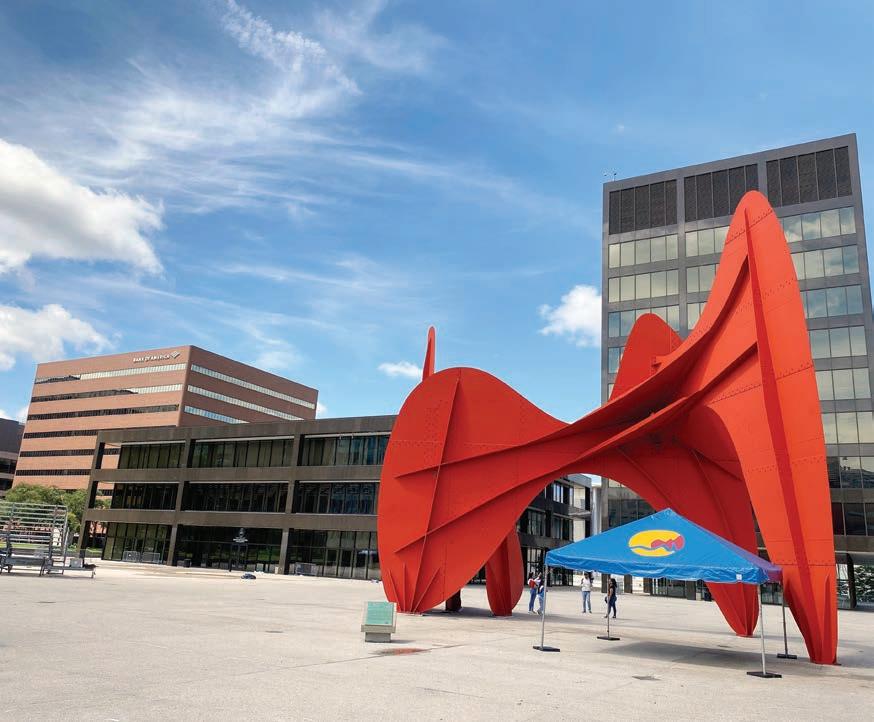
City planners intended the expansive concrete square, which opened in 1969, to serve as the centerpiece of Grand Rapids. However, Calder Plaza hosts minimal foot tra c outside of scheduled events there, particularly compared to the nearby Rosa Parks Circle. Two of the larger events that use the Calder Plaza annually are the Grand
Rapids Pride Festival and the Festival of the Arts, which both draw thousands of people to the plaza.
Calder Plaza was the result of an era of development downtown in the 1960s referred to as “urban renewal.” is involved the city and federal government acquiring and demolishing more than 120 buildings around the plaza so government buildings and new commercial structures could be built in their place, according to local media reports.
Massive redevelopment projects that spanned 70 di erent downtown parcels were made possible when the federal government subsidized the majority of acquisition and demolition
See CALDER on Page 23
Cannabis businesses cry foul over city’s equity rules.
LG Energy Solution eyes Holland for HQ
Decision would bring in ux of white-collar, senior positions
By Kate Carlson
LG Energy Solution is positioning its growing operation in Holland to become the company’s North American headquarters as it scales up battery manufacturing across the country.
e designation could bring an in ux of white-collar and senior-level positions, building on the hundreds of advanced manufacturing jobs LG Energy Solution Michigan is creating on the lakeshore with its $1.7 billion
lithium ion battery expansion in Holland. LG Energy Solution Michigan is a wholly owned subsidiary of Seoul, South Korea-based LG Energy Solution.
“We are seriously considering making this site the headquarters for North America,” Roger Traboulay, project manager at LG Energy Solution Michigan, said during a presentation to local developers on earlier this month at the expansion site in Holland. “If that happens, it would bring in a whole band of directors and senior persons with (a need for) executive-level housing.”
Holland is among the eight
See LG ENERGY on Page 25
CRAINSGRANDRAPIDS.COM I AUGUST 21, 2023 VOL. 40, NO. 17 l COPYRIGHT 2023 CRAIN COMMUNICATIONS INC. l ALL RIGHTS RESERVED
POLICY:
POLITICS AND
PAGE
REAL ESTATE: Empty nesters selling ‘entertainers dream home’ on Mona Lake. PAGE 6
New investment rm focusing on family-owned businesses. PAGE 7
5
FINANCE:
| KATE CARLSON, CRAIN’S GRAND RAPIDS BUSINESS
COVID-19 and separate construction timelines have delayed the Calder Plaza redesign until at least spring of 2026.
Three affordable homeownership units that ICCF Community Homes is currently building in Grand Rapids’ Baxter neighborhood. | NEXT DOOR PHOTOS
ALL THE INGREDIENTS YOUR BUSINESS NEEDS TO SUCCEED.












MICHIGAN PURE OPPORTUNITY ®
No matter how big or small your business is, MEDC is here to help. Get access to funding, find the best talent, and connect with the right partners. We’re your personal concierge for whatever your business needs to succeed.

Seize your opportunity at MICHIGANBUSINESS.ORG








DADDY’S DOUGH














Cannabis businesses cry foul over city’s equity rules
grand Rapids stands behind policy, believes it will be a model for others
By Dustin Walsh
Brandon Kanitz, CEO of Grand Rapids-based marijuana company Fluresh LLC, moved to Traverse City in September 2020. The COVID-19 pandemic had closed schools, the family man needed help with child care and his wife’s family lived in the Grand Traverse region.

But moving put Fluresh in violation of Grand Rapids’ medical marijuana social equity system, which requires 25% local owner-
ship. The city’s licensure scoring system provided “bonus points” to companies that committed to local ownership, a diverse workforce and diversity among its supply base, among other stipulations.
However, at the time, it was a problem without consequence as the city had yet to finalize its social equity program or enforcement regime. Then came Jan. 1. The city now requires companies to abide by the social equity commitments or face a fine of up to 5% of sales or risk their business license not be-
ing renewed.
In April, Fluresh was fined $60,000 for Kanitz’s move and must pay the total into the city’s new marijuana social equity nonprofit fund, which aims to distribute money to projects that benefit disadvantaged groups in the city impacted by drug laws, for the next three years.
“It’s a circus,” said Shoran Reid Williams, general counsel for Fluresh. “We made the
See CANNABIS on Page 24
Automation transition requires ‘digital mindset’
Manufacturing leader says that’s what will keep state competitive
By Kayleigh Van Wyk
Remaining competitive in Michigan’s manufacturing space will require owners of all sizes of businesses to shift their mindset beyond simply buying equipment to automate their processes.

That’s according to Tom Kelly, the CEO and executive director of Troy-based Automation Alley, who participated in a panel discussion at the recent Advanced Manufacturing Expo at DeVos Place in downtown Grand Rapids.

“It’s beyond automation — it’s about a digital mindset, it’s about really thinking digitally as an organization,” Kelly said in an interview with Crain’s Grand Rapids Business.
Kelly, who spoke during the event’s panel covering updates on Industry 4.0 adoption in Michigan, oversees the nonprofit Industry 4.0 knowledge center.
As a World Economic Forum
sized and large companies launch into the digital age of manufacturing. The organization has more than 2,300 members across Michigan, almost 400 of which are located in the greater West Michigan region.

Since assuming the organization’s CEO role in 2016, Kelly has worked to refocus Automation Alley’s mission from solely automation to a more holistic approach to the concept of Industry 4.0.
In April, Fluresh was fined $60,000 for the owner’s move from Grand Rapids to Traverse City and must pay the total into the city’s new marijuana social equity nonprofit fund, which aims to distribute money to projects that benefit disadvantaged groups in the city impacted by drug laws, for the next three years. | COuRtEsY OF FLuREsH
Banks report higher commercial loan growth
Economic conditions generally healthy despite softness in some real estate sectors
By Mark Sanchez
Even as U.S. economic growth cooled and interest rates rose, banks based in West Michigan recorded healthy commercial loan demand from business borrowers as midyear approached.
Publicly traded banks headquartered in West Michigan reported solid commercial loan growth in their quarterly earnings over the last several weeks. However, executives reported some softness within certain economic sectors such as commercial real estate, particularly office space, and residential mortgage lending, as well as delays in expansion projects by some business clients.
Grand Rapids-based Independent Bank Corp. (Nasdaq: IBCP) recorded 9.8% annualized commercial loan growth through the first half of 2023 and added $66.9 million in the second quarter alone. The bank ended the second quarter with $1.54 billion in commercial loans as of June 30.

Independent Bank executives expect commercial loan growth to continue for the rest of 2023.
“Economic conditions remain generally healthy throughout our markets, and we continue to see attractive lending opportunities,”
Independent Bank President and CEO Brad Kessel said in a conference call to discuss quarterly results. “Our commercial pipeline is healthy with high-quality lending opportunities and we believe that we can continue to grow our portfolio of clients, capturing additional market share and deliver strong financial performance for our shareholders.”
Much of the growth went toward commercial loans for working capital and operating lines of credit, or for industrial loans.
Chief Lending Officer Joel Rahn said additions to Independent Bank’s commercial lending team in the last two years served as a “strong contributor” to the loan growth.
Holland-based Macatawa Bank Corp. (Nasdaq MCBC) grew total commercial loans by 7% in the first half of the year to $1.04 billion at the end of June. Since midyear 2022, Macatawa Bank added $122 million in commercial loans.
The commercial loan growth that Macatawa Bank recorded in the last 12 months “was the direct result of both new loan prospecting efforts and existing
Advanced Manufacturing Hub (AMHUB), Automation Alley’s mission is to help small, mid-
“The term ‘automation’ had become almost a pejorative because, back in the day, automation was equated
August 21, 2023 | CRAIN’s gRAND RAPIDs BusINEss | 5
The 2023 Advanced Manufacturing Expo in Grand Rapids featured exhibitions and panels on the shift to automation.
| KAYLEIgH VAN WYK, WWW.ADVANCEDMANuFACtuRINgEXPO.COM
“It’s beyond automation — it’s about a digital mindset, it’s about really thinking digitally as an organization.”
See MANUFACTURING on Page 25 Mercantile Bank’s headquarters in Grand Rapids. | COuRtEsY PHOtO
BANKS on Page 23
Tom Kelly, the CEO and executive director of
Troy-based Automation Alley
See
Empty nesters selling their ‘entertainers dream home’
winter months in Florida.
Putting their stamp on the place
By Rachel Watson
Phil and Jil Nehra weren’t house-hunting for their family of nine in 2015, but a “what the heck” stop at an open house on Mona Lake one day sealed the deal and they realized they had to have this ranch-style beauty.

The Nehras — he’s a salesperson for Muskegon-based Action Industrial Supply Co., and she’s a now-retired insurance billing professional with Shoreline Allergy in Norton Shores — were out on a supply run for their home on Phil’s birthday eight years ago, when they saw a sign for an open house. Curiosity took hold, so they stopped inside.
They immediately saw the place’s potential. Even though “a house for Phil’s birthday” wasn’t on their shopping list, they went home and put their previous place up for sale so they could buy the property in Norton Shores on Mona Lake. They closed on the purchase in June 2015 for $270,000.
This is their fourth unplanned flip in the past two decades, Jil Nehra said. Each time they’ve traded in a house, it’s been spur of the moment.
“We have not gone through many houses. We just usually find the ones we want and end up buying them,” she said.
Built in 1964, the Mona Lake home boasts about a half-acre lot, more than 3,000 square feet of living space, a showstopper kitchen and plenty of room to spread out, three beds, two-and-a-half baths, a heated two-car attached garage, a giant deck overlooking a large backyard and a long staircase leading downhill to their dock on the lake.
It’s also a 10-minute boat ride to Lake Michigan via the Mona Lake channel.
When the Nehras got together 20 years ago, they blended a family of seven children, ages 6 to 15. Now, all of the children have flown the nest, so the Nehras don’t need the large family home.
They recruited their son-in-law, Ben DeMuro, a Realtor with Re/ Max West in Muskegon, to list the house for $975,000 on July 26.
Nehra said after selling, she and her husband plan to build a smaller house for themselves in Norton Shores to live in during the summer while spending a few of the
Nehra said the house was in “good shape” when they bought it, albeit out of date. An elderly couple named the Bytwerks previously owned it, but John Bytwerk had died, and his widow was ready to move on.
A tidbit for fans of the “Barbie” movie — “It had a hot pink dining room,” Nehra said, laughing. She said it had to go.
During the first five or so years they owned the place, the Nehras did a floor-to-ceiling renovation and modernization inside and outside the home.
They ripped out 20 large trees from the backyard — leaving the stumps and root systems in place to prevent erosion. That’s because when they bought the property, the view of the lake was entirely obscured.
“You just couldn’t see the lake, and that’s the point of living on a lake, is to see it,” she said.
They also built a large back deck, and now, every single room on the back of the house has sliding doors that open onto the deck overlooking Mona Lake.
“If you want to get up and walk out in the morning, you can get up and walk out to the deck. It’s benefited (the property value), and it looks great, and it’s kind of fun,” she said.
Their best decision
Indoors, the biggest change they made was to convert the enormous former living room into a kitchen.

the most-used room of the house.
“The kitchen area, with the fireplace in it, is spectacular. When it’s colder and the fireplace is running, and everybody’s there eating Sunday dinner, that’s what it’s all about,” she said.
The new kitchen has an unusual layout, but it works, Nehra said.
The front half is where the food preparation happens, with all the appliances, countertops, pots and pan storage, and room for a small seating area. Then, there’s a large brick chimney wall with a wine rack on the food prep side and a fireplace on the other, effectively dividing the kitchen in half.
The back half of the kitchen overlooks the lake and contains a coffee bar area and a massive, custom-built island that is 5.5 feet wide by 13 feet long and can seat about 10 people.

Adjoining is a dining room, which seats another eight-plus and flows into a living room that can accommodate seven or eight comfortably. Part of the living room used to be a three-season room, but they took down an exterior wall to bring it fully indoors.
dream home” for its abundance of gathering space.
“It was built around entertaining and openness and enough space for all of our families,” he said. “The island in the middle is massive; you can fit so many people around the island and just have so much laughing and game time and hooting and hollering and basically family fun.”
Sleeping spaces
As a ranch-style home, the bedrooms are also on the home’s only floor.
The Nehras decided they wanted a room the grandkids could play in that’s separate from the main living areas, but they didn’t want to sacrifice a bedroom. So they turned the former primary bedroom at the front of the house into a combined TV room/toy room/bedroom featuring a Murphy bed that’s perfect for overnight guests.
“That was our master bedroom to begin with, but we wanted to be on the lakeside in our master bedroom, so we flipped that,” Nehra said.
plumbing and tile. The ensuite primary bath features a honeycomb tile heated floor and walkin shower, geometric mirrors and honeycomb light fixtures, and a wood sink atop a four-drawer cabinet.
Another full bathroom is painted forest green below the picture rail and off-white above, with contrasting styles of white tile for the floors and shower, a marble-grain counter with a large mirror and contemporary chandelier-style light fixture above.
There’s also a half-bath on the other side of the house off the kitchen that’s soft taupe contrasted by the black, brown and white sink fixtures.
The home is completed by a mudroom, laundry room and storage closet accessible from the garage, near the kitchen.
In the front yard, there’s a shed that mirrors the design of the house that the Nehras had custom-built by Amish builders and delivered in one piece.
“When we bought the house, the (sellers) had a baby grand piano in (what’s now the kitchen), a dining room set, a full living room set, and it was a very large room,” Nehra said. “So when we were doing our renovation drawings and all that, my husband finally said one day, ‘Why don’t we just flip the living room and make the living room the kitchen because we have a big family?’”
Nehra said it was the best design decision they could have made, as the kitchen turned out to be “by far”
The kitchen also flows out onto the back deck, where the patio furniture they’ve been using essentially creates another dining room for six to eight people as well as another couple conversation areas with rocking chairs.
All those seats have been put to good use, Nehra said, noting that they have 40 people in their immediate family alone, and they’ve often hosted holiday gatherings with the full group.
DeMuro, the Nehras’ son-in-law and broker, described the place in the listing as an “entertainer’s
For the new primary bedroom on the far corner of the house, they created a beach vibe, with a rich wood-grained floor and wood-paneled wall behind the bed and deck access by a slider. There’s also a dresser and a TV flanked by twin closets — “my husband’s a big TV guy,” Nehra said.
Next door is the third and smallest bedroom, which is carpeted, has a small closet and features just enough room for two small nightstands and a dresser.
Bathrooms and beyond
The Nehras redid all of the bathrooms with modern fixtures,
“The shed is there because we needed space for the riding lawn mower and all our patio furniture,” Nehra said.
Who will the next owners be?
DeMuro said he’s hosted showings “every day since it was listed” but had no written offers as of Tuesday, Aug. 1.
He said Muskegon County has very few old homes of this size that have been renovated to this standard, so it’s likely at the top end of the usual price range for lakefront homes in the county.
When asked how much money they spent on renovations, Nehra said she doesn’t have an estimate because they did the work so gradually between 2015 and 2020.
6 | CRAIN’S GRAND RAPIDS BUSINESS | AUGUSt 21, 2023
this
is owners’ fourth ‘unplanned’ flip in two decades
Built
in 1964, the Mona Lake home boasts about a half-acre lot and more than 3,000 square feet of living space.
The Mona Lake house in Norton Shores is for sale for $975,000. | RE/MAX WESt IN MUSKEGON
New investment firm focusing on family-owned businesses
Vekst Capital will tap individual investors to invest in individual transactions
By Mark Sanchez
A new private investment firm seeks to acquire family-owned businesses based in West Michigan and retain ownership for the long term.
Vekst Capital Inc., which Grand Rapids businessman Tim Engen launched in July, wants “to serve and help our businesses thrive with not only an existing private investor portfolio, but also through new investors,” he said.
The firm will invest in privately owned, growing or scalable companies that are profitable. The firm will focus investments in the western Lower Peninsula in a market that runs from Lansing to the lakeshore, and from the Michigan/Indiana border to Mackinaw City, as well as in Southwest Florida where Engen recently expanded a few of his businesses.
“Because of the way we’re structured, we have more flexibility than traditional private equity. We provide our companies with the support that will complement or enhance their existing resources and follow their vision,” Engen said.

Engen owns a number of businesses in West Michigan with his father, James Engen, and brother, Ryan Engen. Those companies include Vision Real Estate Investment, Carbon Builders LLC, CarbonSix Construction Inc., and information technology service provider People Driven Technology Inc.
Guided by “Midwest values,” Vekst Capital looks to ride the “silver tsunami” that’s driven by an older generation nearing or at retirement age and business owners who are ready to sell and exit, said company President Steve Tolger. The firm’s “sweet spot” is companies with $1 million to $5 million in EBITDA (earnings before interest taxation depreciation and amortization), Tolger said.
“Our goal really is to find good West Michigan companies,” he said. “West Michigan is chock full of these great family-owned businesses where the owners are hitting their end and looking for retirement, or their kids don’t want to take the business on and continue it, or they’ve grown a business here and they’ve done really well, but they’ve kind of hit their limit on how big they want to grow it or hit their max on how much effort and even capital they want to put into the business to make it bigger.
“We just see this great opportunity to connect with some business owners here because we know that there are so many good businesses owned by families here that are going to be in this situation or are already in that situation.”
Tolger was the first employee at Vekst Capital. Steve Smith serves as Vekst Capital’s chief financial officer.
A Grand Rapids native, Tolger previously worked at Ernst & Young in Chicago and RA Capital Advisors, an investment bank in San Diego, Calif. He most recently led M&A and growth for private equi-



ty-backed Alliance Physical Therapy Partners LLC in Grand Rapids.
Vekst Capital operates differently than traditional private equity. Rather than raising a pooled investment fund, Vekst Capital will tap individual investors who may want to invest in individual transactions, Tolger said.
The investment firm will remain flexible in how deals are structured. That includes the seller retaining a position in the business, whether as an executive, a shareholder or both, or timing their exit over an
extended period, he said.
Tolger hopes Vekst Capital can close its first transaction by the end of 2023, “but we’re not going to buy just to buy,” and intends to hold companies for the long term. That’s a strategy that Tolger believes will appeal to sellers of family-owned businesses.
“We believe in a business and when you hold it long term, you give it more time to grow. Three to four years typically is not enough time to actually make substantial growth,” he said. “We just see our
hold as a lot longer and on the same page as the owner’s knowing that their business is in hands where you know the employees are going to get taken care of, and the new owners are really investing in the business and the people, in-
stead of just trying to flip a profit, we believe is going to go a long way here.”
Vekst Capital will also look to co-invest in companies with other investment firms and will do deals to provide growth capital to a business “if it’s with the right owner and the right business,” Tolger said.
“From an industry perspective, we’re pretty agnostic at this point,” Tolger said.
August 21, 2023 | CRAIN’s gRAND RAPIDs BusINEss | 7 Blue Cross Blue Shield of Michigan and Blue Care Network are nonprofit corporations and independent licensees of the Blue Cross and Blue Shield Association. Value-driven
More
Better
Attracting better talent starts with having better benefits,
bcbsm.com/employers
plans.
resources.
business benefits.
and we’re ready to help.
At Blue Cross, we know you want the best for your employees. That’s why we’re ready to help with plans designed to fit any budget, and coverage you can use anywhere, thanks to one of the largest networks of doctors and hospitals in Michigan. From maternity and menopause to mental health and virtual care, we offer whole health coverage and solutions that you and your team can trust.
Tolger Smith Engen
Innovation Park fosters new tech startup partnership

twisthink, Spartan Innovations provide expertise to create ecosystem
By Kayleigh Van Wyk
As part of its relocation to downtown Grand Rapids this year, digital consulting firm Twisthink LLC has formed a partnership with new neighbor Spartan Innovations to lend engineering and development services to startups.
Last year, Twisthink announced plans to relocate its headquarters from Holland to a 10,900-squarefoot space inside the Michigan State University Doug Meijer Medical Innovation Building that’s part of the school’s Grand Rapids Innovation Park campus in downtown Grand Rapids.
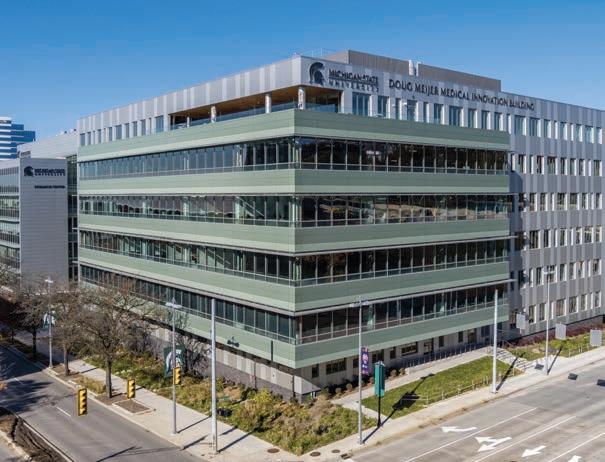
On a lower floor of the building, startup accelerator Spartan Innovations operates as a venture creation entity for the MSU Research Foundation, helping MSU entrepreneurs develop ideas, create business plans and successfully launch high tech ventures.
Twisthink’s move and an idea to make the park more of an ecosystem ended up igniting a partnership between the two companies.
“MSU is a big reason why we’re here in this building … and one of the thoughts even before we moved in was that it would be amiss if we all just coexisted in this building,” said Taryn Kutches, vice president of brand and business development at Twisthink. “It wouldn’t really add value to the
Innovation Park if all we did was say ‘hi’ up and down the elevator or run into each other in the parking lot, then go about our business every day.”
Kutches said she had connected with Kyle McGregor, director of health innovations at Spartan Innovations, prior to the move. The two planned a series of regular meetings between Twisthink and Spartan Innovations, and within a few minutes of the first meeting, Kutches said a plan took shape to leverage the partnership.
Twisthink now is offering regular monthly office hours — time slots purchased by Spartan Innovations — for any startups using the incubator. The startup teams can book a time slot to seek input on various strategy, technology or design-related problems.
“Maybe they just need help de-


hours for them to come up and meet with our team,” Kutches said. “It’s a benefit for startups because they can get services that are supported by Spartan Innovations from our team, which is just right upstairs.”
Kutches said the Twisthink team is currently engaging with two startups as the partnership program is still in its infancy. The vision is that the program would run indefinitely through a long-term partnership, she said.
“Our hope for this program is that it builds and grows, and that ultimately we help these startups create impact and scale and grow in a way that’s effective and successful for them,” Kutches said. “This all ties back to, I think, The Right Place’s 10-year tech strategy of trying to get Grand Rapids on the map in terms of digital innovation.
McGregor also said the partnership with Twisthink is “a win” for the Grand Rapids entrepreneurial community and tech strategy.
As The Right Place’s tech strategy for Grand Rapids has unfolded this past year, McGregor sees more opportunities for collaboration between companies in West Michigan focused on technology or innovation.
nership to have access to the technical expertise of the Twisthink team. With all of the challenges that come with entrepreneurship, especially with needing various skill sets to develop and market a successful product or platform, McGregor said having help and a fresh perspective from an outside entity can be critical.
veloping something, or they need help designing a product or an interface, or they need help mapping out their strategy — whatever that may be, we’re hosting office

And helping startups excel and grow and stand on their own is a big part of that. That’s ultimately why the partnership made sense and why we’re working together.”
“I think we’re going to continue to see more of that — I think that’s the sign that an ecosystem is maturing and moving on to the next phase of growth,” McGregor said. “And I think there’s been a ton of great examples, especially over the last year or two, of companies being able to come together and truly work together and partner to build amazing things.”
For McGregor, it’s beneficial for the startups using the new part-
“For any entrepreneur who’s going to figure out how to solve a real problem … you’re almost going to have to rely on some outside parties to be able to help you in that journey,” McGregor said. “Sometimes getting out of your own way and actually reading things as they are written in black and white as opposed to how you want to interpret them is really challenging. That’s why a third party often is helpful, and Twisthink has been able to lean into that role.”
Business accelerator, lender receive $3M
Funds will be used to support startups
By Mark Sanchez
Start Garden and small business lender Northern Initiatives were awarded $3 million in federal funding to support entrepreneurs.
Through their partnership, the two organizations hope to enroll 400 early-stage companies over four years in entrepreneurial support programs and help them access capital with a goal to create 300 new businesses and 645 jobs.
“We just want to knock down some hurdles,” Elissa Sangalli, president of Marquette-based Northern Initiatives that operates in West Michigan, said in a statement. “Too many entrepreneurs are still being denied opportunities for education, for capital, for growth. We’re opening the doors and continuing to deepen our impact around the state.”
The money from the U.S. Department of Commerce’s $125 million Capital Readiness Program was made available through the federal 2021 American Rescue Plan Act.
The Capital Readiness Program
provides federal funding to business incubators and accelerators with expertise to assist and train minority and other underserved entrepreneurs to start or scale their businesses in high-growth industries.
The two organizations launched their partnership with 10 finalists in this year’s Start Garden 100 who automatically became eligible for a $20,000 loan.
“Every year we are completely inspired by the hustle and dedication so many entrepreneurs bring to the 100 competition, but they don’t fall under traditional lending qualifications because they’re too early. Northern Initiatives has boldly stepped up to recognize their earning potential and match the money we’re giving away with their loan program,” Start Garden co-director Darel Ross said in a statement.
Northern Initiatives and Start Garden plan to host cohorts of entrepreneurs that will work together on business planning, financial reporting, hiring practices, projections, and other business operations.
8 | CRAIN’S GRAND RAPIDS BUSINESS | AUGUSt 21, 2023 Advia is an Equal Opportunity Lender. Federally Insured by NCUA. A Lender big enough to provide the options you need, and small enough to know you by name. You know your business and path to continued growth. We’ll help you navigate that path with a custom lending solution - providing expertise in commercial real estate, working capital and equipment financing. Michigan | Illinois | Wisconsin adviacu.org $2.0 Million Financed Multi-Building Medical Office in Greenville, MI
Digital consulting firm Twisthink’s move to the Doug Meijer Medical Innovation Building downtown spurred a partnership with Spartan Innovations to help startups.
| COURtESY OF MICHIGAN StAtE UNIVERSItY
“MSU is a big reason why we’re here in this building … and one of the thoughts even before we moved in was that it would be amiss if we all just coexisted in this building.”
Taryn Kutches, vice president of brand and business development at Twisthink





UnitedHealthcare Level Funded plans are built to give your Michigan business more ways to save. Because in addition to lower costs, they’re designed for a potential surplus refund2 if your plan participant medical and pharmacy claims are lower than expected. Talk to your broker or learn more at uhc.com/savingsmi Up to 17% lower employee health plan costs1 are just the beginning 1 Average savings for UnitedHealthcare Fully Insured groups 2–50 nationwide migrated to UnitedHealthcare Level Funded, Jan. 1, 2021–Dec. 31, 2022. Savings are not guaranteed. 2 Please consult a tax and/or legal advisor to determine if, by receiving this refund, there are any restrictions or obligations. Surplus refund available only where allowed by law. Administrative services provided by United HealthCare Services, Inc. or their affiliates, and UnitedHealthcare Service LLC in NY. Stop loss insurance is underwritten by UnitedHealthcare Insurance Company or their affiliates, including UnitedHealthcare Life Insurance Company in NJ, and UnitedHealthcare Insurance Company of New York in NY. B2B EI232281706.0 6/23 © 2023 United HealthCare Services, Inc. All Rights Reserved. 23-2408250 More savings Exemption from many state premium taxes and Affordable Care Act regulations More flexibility Choice of a variety of network and plan designs, plus wellness programs and telemedicine at no additional cost More stability Stop loss protection from unexpected high claims and fixed monthly costs like a traditional health plan
More details emerge on S.S. Badger incident
Car ferry owner launches internal investigation
By Rachel Watson
The company that owns the Lake Michigan Carferry is launching an internal investigation into a recent docking incident that ended the S.S. Badger’s sailing season two months early.

Company officials say the internal review will help to determine how a counterweight plunged off a tower affixed to the dock and into the lake on July 21 in Ludington.
Mark Barker, president of Interlake Maritime Services, the division of Middleburg Heights, Ohiobased Interlake Steamship Co. that operates Lake Michigan Carferry, earlier this month to Crain’s Grand Rapids Business that the company is performing an internal review of the incident that took place as the vessel was unloading its human and vehicle cargo.
Barker said such an incident has never happened for Interlake, which acquired the Badger and the ferry business in December 2020.
“No one was injured, nor was the vessel damaged, but our team noticed something was going a little weird and then isolated the area and made sure everyone was safe,” he said. “We’re doing an internal investigation because we want to understand … what the cause of it was.”
Barker said the incident oc-
curred well after the ship had docked and begun unloading early on the morning of July 21, after the Badger’s overnight return trip to Ludington from Manitowoc, Wis. The ferry this summer had resumed running “doubles,” or twice-daily trips across Lake Michigan, for the first time since the pandemic began.
“We had cars and people aboard, and we tied the vessel up, secured it, (mostly) unloaded it, and then we had the collapse of the tower,” he said.
Immediately after the incident, the rest of the vehicles and passengers were safely ushered off by the crew despite the damage, a passenger previously said. The company will now work to clear the collapsed structure and erect a new one.
Rather than being mounted on the ship itself, the ramp that allows the crew to unload the ship is attached to land at the very end. In the middle, it is secured to two large towers on either side of the ramp. The towers are mounted on land and extend out over the water with two beams bearing counterweights that further secure the ramp so it can hold the weight of multiple vehicles disembarking at once.
When the ship is ready to unload, the ramp operator adjusts the height of the ramp according to the water level and the level of the vessel, which depends on the weight of its cargo load. Then, the ramp is secured to the ship for the duration of unloading.
“One of those towers that have
that large beam, the counterweight, which we use to lower and raise the ramp, had some failure and the tower fell into the lake,” Barker said.
Barker added that Interlake will pay for the damage, as it owns the equipment, and the company will file an insurance claim for reimbursement.
Lisa Stewart-Hartsock, a bystander who observed the incident from land, previously told Crain’s Grand Rapids there was “a terrible crunching sound” as she watched the ship in port that morning. A video she provided to Crain’s seemed to capture a metal grinding followed shortly by a splash, though she was filming from the starboard side, with the view of the counterweight obscured by the ship.
Barker said the sound was not from the impact between the ship
State’s ag exporter of
Zeeland Farm Services is well positioned as other firms emerge from pandemic
By Abby Poirier
Zeeland Farm Services Inc. was recently named the 2023 Michigan Ag Exporter of the Year, a recognition from the state as the company braces for stiffer competition after tapping new markets during the pandemic.
Zeeland Farm Services, an agricultural services company operating from Zeeland, primarily processes, transports and exports Michigan-grown soybeans and soybean meal.

To be eligible for the annual Michigan Department of Agriculture and Rural Development award, more than 50% of a company’s product must be grown, processed or manufactured in Michigan, and exports must have contributed substantially to a company’s growth overall. Zeeland Farm Services’ primary export is non-GMO soybean meal, about 90% of which comes from Michigan-grown soybeans.
“Companies like Zeeland Farm Services are an example of why international buyers continue to view Michigan as the best place for food and agricultural businesses.
Zeeland’s work helps to ensure that ‘Made in Michigan’ is recognized around the world,” MDARD Director Timothy Boring said in a statement.
Zeeland Farm Services Chairman Cliff Meeuwsen said the win “signifies a great job that was done by all of our people.” This is the second time the company has been recognized with the award, after first winning it in 2009.
In 2022, Zeeland Farm Services exported approximately $23 million in food-grade soybean products and an estimated $180 million in feed-grade products. The business exported around 3,000 containers totaling 60,000 tons of food-
and the tower or the dock, but likely was the sound that the actual tower made as it fell.
“When large metal structures fall, usually you hear crunching, I suppose,” he said.
He said that Interlake frequently checks its infrastructure and there was “no indication” that failure of the tower was imminent, “so it was a surprise.”
Barker said he is unaware of any external investigation of the incident by the U.S. Coast Guard or other regulating body.
A public affairs representative for the Coast Guard’s Cleveland-based Ninth District, which oversees the five Great Lakes, the Saint Lawrence Seaway and parts of the surrounding states, declined to disclose whether any such investigation has started. The department did not immediately respond when later asked by email
for information about what circumstances would require an investigation of a passenger ship incident in port.
Barker said the incident has spurred much “speculation” about what happened, and his communications team planned to help him briefly address the rumors.
“We’re going to be putting out a video in the next day or two or three, just having me talk about the situation so that we can … attempt to stop speculation. Everybody has an opinion on this. They seem to know more than I do. And I’m called every day about it,” he said earlier this month.
Built in 1952, the S.S. Badger began serving as a passenger and car transporter in 1992, two years after its service as a train car ferry ended. When Interlake acquired the Lake Michigan Carferry service and the ship in late 2020, Barker said the loading and unloading infrastructure on the dock was already old, though he’s uncertain of its exact age.
“The infrastructure this boat runs off, it’s been around for long periods of time, and we bought that company, we bought the infrastructure, so at the end of the day, I think it’s just unfortunate. Things break, and this is an unfortunate event.
“We’re working toward repairing it and getting the ramp back up operational and getting the vessel back operational,” he said.
Barker previously said that the company plans to restart ferry service for the 2024 season.
the year ready for future
COVID, but as the rest of the world comes back online, business is starting to slow and return to normal.
“I think we’re going to have a couple of tough years as our competitors have come back online,” he said. “They’re buying back their customer base. We’re going to try to hold our own.”
grade soybean products, sending it to countries in the Pacific Rim such as South Korea, Japan and Taiwan, as well as into Canada and Europe.
Meeuwsen said it was a “big
year” for the company’s food-grade products, while the feed-grade side of the business continues to grow.
The win comes on the heels of a record-breaking year for Michigan agricultural exports in 2022. According to the U.S. Census Bureau, Michigan’s food and agriculture exports totaled $2.7 billion, marking 8% yearover-year growth from 2021. Animal feed, soybean and soybean residue, brewing waste and sugar beets represented $335 million in exports in 2022.
Zeeland Farm Services has grown post-pandemic as global
competitors struggle to emerge from COVID-related transportation disruptions.
“Here in the U.S., we came out of that faster,” Meeuwsen said. “And as a company, we came out of it much faster and we were able to supply needs and take customer bases from our competitors around the world.”
Zeeland Farm Services avoided some of the slowdowns other businesses experienced and continued to move product throughout the COVID-19 pandemic, helping to propel the business into new markets.
Meeuwsen said the company increased its export numbers post-
Michigan State University’s 2023 Outlook for Michigan Agriculture report from this spring noted that soybean prices will likely fall significantly in the coming year, estimating a decrease from $14.30 a bushel in the 2022-23 crop year to $12.90 in the 2023-24 crop year. According to the report, soybean exporters will also face stiff competition from South America as other countries experience record crops.
Zeeland Farm Services, a family-owned business founded in 1950, first began exporting in 1999. Since then, the company’s export team has grown to 12 employees who are solely focused on exports.
“I think that we’ll come back in the next couple years and increase our business,” Meeuwsen said. “Our product is still the best in the world and our people are working hard at these issues, so I think we’re going to come back pretty strong. Our customer base knows that we can deliver. When the going gets tough, we still deliver.”
10 | CRAIN’S GRAND RAPIDS BUSINESS | AUGUSt 21, 2023
Family-owned Zeeland Farm Services Inc. was founded in 1950 and began exporting agricultural products in 1999. COURtESY OF ZEELAND FARM SERVICES
The S.S. Badger car ferry coming into port in Ludington. | SPEED SHOt PHOtOGRAPHY
“I think that we’ll come back in the next couple years and increase our business.”
Cliff Meeuwsen, Zeeland Farm Services Chairman
$86M pediatric center clears key CON regulatory hurdle
state approves 40 licensed beds for Pine Rest’s new facility
By Mark Sanchez
Pine Rest Christian Mental Health Services expects to begin construction late this fall or early winter on an $86 million pediatric center after securing state regulatory approval for additional psychiatric beds.
The Michigan Department of Health and Human Services late last month issued a certificate of need for 40 new licensed child and adolescent inpatient beds for the 66-bed Pediatric Behavioral Health Center. Pine Rest will also relocate 26 existing licensed beds from its Van Andel Center at the 68th Street campus in Cutlerville to the new pediatric center, which also will be located on the campus.
While approval for the additional 40 beds was never in doubt, the final decision from the state on Pine Rest’s CON application clears a key regulatory hurdle for the project to proceed, Chief Operating Officer Bob Nykamp said.
“It’s a big hurdle because the beds are the asset. You can’t build



the center without the beds that are regulated by the state,” Nykamp said. “Now it feels like we’re really on our way.”
Planned in partnership with Corewell Health’s Helen DeVos Children’s Hospital, the 134,840-square-foot Pediatric Behavioral Health Center on the Cutlerville campus will consist of three 22-bed units. When opened in late 2025 or early 2026, the
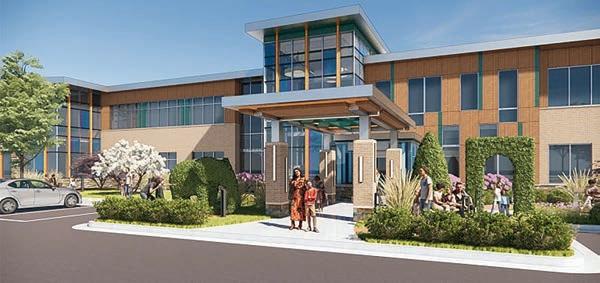
pression, anxiety and eating disorders.
The state Department of Health and Human Services expedited its review of Pine Rest’s application for the 40 additional beds and issued the CON on July 31.


two-story center will include an inpatient treatment facility for children and adolescents, psychiatric urgent care, a crisis stabilization unit, and specialty outpatient clinics to prevent mental health crises for conditions such as de-
“Everyone deserves access to quality health care where and when they need it,” said Elizabeth Hertel, director of the state Department of Health and Human Services. “These additional 40 beds will help families receive the care they deserve for their children and is part of the state’s commitment to ensuring access to behavioral health services for Michigan residents of all ages.” The center will expand the number of licensed child and adolescent inpatient beds at Pine Rest from 36 to 76 at the Cutlerville campus. Pine Rest plans to house another 26 “flex” beds at the center that can transition as needed from use between teens, young adults and adults.
As Pine Rest finalizes the cen-
ter’s design and completes an environmental assessment on the project site, planning has begun on how to reuse the remaining 10 licensed child and adolescent beds at the Van Andel Center. That process includes focus groups with former patients, parents, pediatricians and others, Nykamp said.
“Right now, we’re talking about what specialty does the community need?” he said. “What else specifically do we need?”
Eating disorders and autism are two areas “that come to the top of the list,” he said.
Pine Rest forecasts that the Pediatric Behavioral Health Center, along with planned service expansions and new care models, will expand inpatient care by 3,000 children annually and by 10,000 for outpatient care.
Meanwhile, Pine Rest will continue a $50 million capital campaign for the project. The capital
campaign remains in a “quiet” phase with appeals to potential major donors across the state.
Pine Rest also has requested a $25 million grant from the state from funding that’s available through a $50 million appropriation in the present 2023 fiscal year budget to expand behavioral health capacity in Michigan amid rising incidence rates for mental health, particularly for anxiety and depression.
“That would be another big boost to the project,” Nykamp said.
The state previously committed $36 million toward the Pediatric Behavioral Health Center. Crain’s Grand Rapids Business reported in June that the original $62 million cost of the project had grown to $86 million based on staff recruiting needs, more outpatient capabilities and inflationary pressure on construction materials.

August 21, 2023 | CRAIN’s gRAND RAPIDs BusINEss | 11
A rendering of Pine Rest’s proposed $86 million pediatric behavioral center south of Grand Rapids. | PINE REst CHRIstIAN MENtAL HEALtH sERVICEs
“Everyone deserves access to quality health care where and when they need it.”
Elizabeth Hertel, director of the state Department of Health and Human Services
Benefit firms partner to pitch self-funded health plans

Lead executives have known each other for more than 15 years
By Mark Sanchez
Forming a strategic partnership gives two West Michigan employee health benefit firms that specialize in self-funded coverage a deeper talent bench.

Through the alliance, staff at Merit Benefit Advisors LLC now serve new and existing clients under the Total Control Health Plans LLC brand.

The two firms remain separately owned by their founders, Mike Hill at Total Control Health Plans and Val McCoy at Merit Benefits Advisors. The arrangement did not merge the businesses, “but we believe that’s very much on the horizon,” Hill said.
“We know we’re stronger together as a team, so we’re coming together and kind of walking before we’re running, sharing efforts, presenting to the marketplace as a unified front,” Hill said. “We want to be very smart about how we do this because our businesses are our passions.”
Added McCoy: “We expect that to happen in the future, but we’re just kind of treading lightly right now.”
Hill and McCoy, who serves as vice president of employee benefits, have known one another for more than 15 years. Each executive has more than two decades of experience in the health insurance industry.
McCoy founded Merit Benefit Advisors in Hudsonville in 2019 after working in accounts man-
agement at ASR Health Benefits, a Grand Rapids-based third-party administrator for self-funded coverage that’s owned by Detroit-based Health Alliance Plan. Hill formed Total Control Health Plans in Holland in 2018, focusing on self-funded employee health benefits for employers.
Merit Benefit Advisors and Total Control Health Plans together represent more than 40 employers that combined have about 13,000 covered lives in their health plans. Together, they hope to scale up the number of employers served.
McCoy brings to the partnership knowledge and experience in the third-party administrator field. Hill has expertise in the agency area. The two have “very aggressive” sales goals for the joint effort, Hill said.
“Both of us have grown our books (of business) about as big as we can grow by themselves,”
Hill said. “What we’re able to do now is keep the wheels on the bus and continue to grow because we’ve got a deeper bench and more folks.”
Part of their promise is to provide self-funded clients full transparency on their health plan’s medical claims data, including specifics on charges by care providers and by pharmacy benefit managers for prescription medications. Working together, “we’ll be able to further advance our mission of helping organizations rethink their health care with
greater transparency and lower costs,” Hill said.
“We believe that a health plan should know what it’s going to pay before it pays it,” he said. “We should know every single moving piece within a plan and who’s getting paid what.”
The firms work with multiple third-party administrators, including ASR, to manage employer self-funded plans and access their contracted care networks.
As the cost of health coverage keeps rising, Hill and McCoy believe more employers are willing to consider a self-funded plan that can potentially lower their costs.
A self-funded health plan “is truly a way employers are going to achieve a different result,” McCoy said.
“What we’re all about now is trying to meet employers where they’re at and not present them with solutions they’ve been presented in the past, but help them find alternatives. They’ve reached the point where they’re frustrated with the options that they’ve been presented with in the past,” McCoy said.
Still, self-funded plans are “not for everyone” and “are not easy,” Hill added. He and McCoy want to “change the perception of health insurance among employers,” he said.
“Right now, so many of them believe it’s a lost cause and we want them to understand there’s truly opportunity to change the direction that these things are go-
ing and to buy the care that they want to provide for their employees and not make either party go broke at the same time,” he said. “Sometimes, it’s easier to just budget a six-, seven-, eight- or nine-percent increase and let it roll. That’s fine, but more and more employers are getting to the point that they can’t do that anymore and they’re willing to look at any option.”
The annual cost survey by The Employers’ Association in Grand Rapids found that for 2023, monthly premiums for a family health plan in West Michigan cost an average of $1,643, or $19,716 for the year, across all plan types. An employee-only plan costs $585 a month on average, or $7,020 for
the year.
This year’s survey, conducted in the spring, drew 169 responses that came mostly from smaller businesses. Nearly half had 100 or fewer employees, and 29% employ 100 to 250 people.


In the small group health insurance market in Michigan for employers with 50 or fewer employees, insurers submitted rate proposals to state regulators this summer for 2024 that collectively average a 7.1% increase. That compares with a statewide average increase of 5.8% that regulators approved last year for 2023 small group policies, according to a summary from the Michigan Department of Insurance and Financial Services.
Crain’s event to address workplace mental health
Just a few years ago, discussions of mental health in the workplace were often taboo. That all changed during the COVID-19 pandemic.
Today, companies are placing more emphasis on their employees’ mental health, and several West Michigan organizations are offering services and programs designed specifically to address anxiety, depression and other serious mental health issues. Behavioral concerns are affecting productivity throughout the workforce.
Crain’s Grand Rapids Business will address the issue of mental health in the workplace on Sept. 13 during a Power Breakfast presentation featuring a panel of mental health experts and business representatives, from 7:309:30 a.m. at Frederik Meijer Gardens. Tickets are available at crainsgrandrapids.com under the “Events” tab.
The timely event comes shortly after legislators approved $364 million in one-time funding to expand access to mental health care in Michigan.
“What we have been seeing for quite some time in Michigan and across the country is a real need
for expanded services for mental health care,” said Elizabeth Hertel, director of the Michigan Department of Health and Human Services. “So, this investment is really important to ensure that people have access when and where they need it when it comes to behavioral health services. (It also allows for) different levels of service needs, not just at the crisis level and the inpatient level, but to serve people before they end up in a crisis, and allow for environments for people to go to after they’ve been in an inpatient (facility) to be able to go back into their community.”
Jason Reep, president of The Employers’ Association, will moderate the Power Breakfast panel, which includes:
Scott Halstead, Ph.D., vice president of outpatient and recovery services, Pine Rest Christian Mental Health Services
Cheryl Kuch, senior HR specialist and consultant, Rehmann
Kristin Spykerman, chief clinical officer, Network180
Dr. Kiran Taylor, chief medical officer, Hope Network Crain’s Grand Rapids Business Staff
12 | CRAIN’S GRAND RAPIDS BUSINESS | AUGUSt 21, 2023
Mike Hill of Total Control Health Plans and Val McCoy of Merit Benefit Advisors with Kathryn Bader, director of human resources at Total Control. | COURtESY PHOtO
City increases housing subsidies for its employees
Little-used program incentivizes living within city limits
By Rachel Watson
The city of Grand Rapids bolstered a little-known homeownership incentive program that offers its employees stipends for closing and other costs if they buy homes within the city limits.

The Grand Rapids City Commission approved a resolution at its Aug. 8 meeting making changes to the City Employee Homeownership Incentive program established in 1995 to encourage city employees to reside within Grand Rapids.
Commissioners voted to increase the stipend amounts to a range of $3,000 to $6,000 for employees who live in Grand Rapids and $7,000 for employees who live outside the city, as well as an additional $2,500 for first-time homebuyers.
The grants, which are fully funded by the city and do not draw on state or federal dollars, are not contingent on income levels.
Buyers can put the funds toward prepaid costs such as inspections and title work, as well as closing costs, Grand Rapids Assistant City Manager Doug Matthews said.
Matthews said about $16,000 is
included in the human resources department’s 2024 fiscal year budget for the incentives program, as historically, only two to three people per year have taken advantage of the subsidies. He said if demand proves stronger than expected, the department could ask the city commission for a budget amendment to increase the line item.
“The changes may a) make it more attractive for folks, and b) as we’re in a heightened and competitive market for talent, it may be something that helps recruit folks specifically, not only to come but to stay for a longer period of time,” Matthews said.
The program was established 28 years ago to increase homeownership in blighted and/or economically challenged census tracts in the city, according to a memo about the program from City Manager Mark Washington.
At the time, it provided prepaid or closing costs ranging from $2,000 to $3,000 depending on the area in which a city worker settled. The policy required eligible homeowners to reside at the home they purchased for three years or repay
the grant on a schedule based on length of occupancy.
Washington wrote in his memo that the amended policy, which expands the target geographic area to the entire city and increases the stipend amounts, is intended to address “the changed real estate market and increased cost of housing.”
For example, when the program launched, the target areas deemed blighted were in the urban core, which now contains some of the most desirable and expensive real estate in the city. People no longer need to be incentivized to live in and around downtown.
Also, at the time, the median home value in Grand Rapids was about $77,000, according to the memo. Now, it ranges from about $212,529 to $256,153, according to Zillow and Realtor.com estimates
Washington cited, with median sale prices as high as $267,000 based on the scarce supply and bidding wars.
Washington also noted that the program has been successful over the years, but still, only about 46% of the city’s 1,673 employees reside within Grand Rapids.
Matthews said the administration
SPONSORED CONTENT
and commissioners did not set a target for what percentage of city employees they would like to see live in Grand Rapids. He added that Michigan law bars employers from setting residency requirements, so the program was established to incentivize, rather than compel, city living.
Washington said the city hopes the amended program will help employees better engage with the community and the neighborhoods they serve, alongside addressing housing affordability.
“For years, we have been talking about housing availability and opportunities for members of our community in general and creating more affordability. But we’ve also looked at that issue within our workforce, And we, too, would like to have more city employees live in our city, in our community,” Wash-
ington said during the meeting. “About half of our employees do so now, but we are always looking for ways to create benefits for our employees and also competitive ways to recruit and retain employees. So this is another tool.”
The amended policy also requires that stipend recipients reside in the homes for five years rather than the original three, with slightly more stringent terms of repayment for noncompliance with the five-year rule.
“The idea is not just to get folks living here and working here but also staying with the city,” Matthews said. “Every industry is having issues both with recruitment and with retention. We want to make sure … folks continue to see value both as an employee and as a potential resident.”

ENERGY MANAGEMENT SOLUTIONS THAT BENEFIT YOUR BUSINESS
By Consumers Energy
We’ve all heard the saying, “Time is money.” And if you own or operate a business, you know it all too well. You know the day-to-day needs of your business, and every hour spent balancing them is a precious resource. Staffing, facilities, serving customers — with so many responsibilities competing for a portion of your day, finding time to prioritize energy management can be challenging. Yet, it’s a challenge worth meeting for your bottom line and your team — all while caring for the planet. That’s why Consumers Energy has been partnering with businesses of all sizes for over a decade to help find the best ways to save. With energy expertise and time-saving guidance, businesses can kickstart their energy savings journey with less effort and less cost. It all begins with an energy consultation.
What exactly is an energy consultation? It’s a conversation with an expert Energy Advisor to review your business’ energy use, operational needs and goals. Consumers Energy will help you understand where your energy dollars go, how you can use and spend less, and which products from their full portfolio of energy management solutions are the best fit for your business. Any business that is a customer of Consumers Energy qualifies to receive a consultation. Best of all, it’s free.
Many of the energy management products available actually pay to participate – through
CRAIN’S CONTENT STUDIO
cash rebates or bill credits. And, after your consultation, all the products require little to no additional time investment, so you can stay focused on your operations. To schedule a free energy consultation, commercial and industrial business customers can call 877-607-0737 or complete the form at ConsumersEnergy.com/StartSaving. Small and medium businesses can call 855-210-5240 or complete the form at ConsumersEnergy.com/SmallBusinessSavings.
Wondering how much your business can save by getting an energy consultation and participating in energy efficiency programs?
Consumers Energy has solutions that offer savings at a variety of levels, depending on the size of your business. For example, upgrading lighting and water fixtures with energy efficient products can save a small business thousands of dollars per year in energy costs. At the industrial level, the savings can climb into the millions.

On top of dollar savings, participating in efficiency programs can boost your bottom line by improving safety, comfort and productivity for your team. Lighting upgrades improve line of sight in the workplace and security in parking and loading areas. Efficient motors for equipment like chillers and compressors reduce noise to help keep employees focused and reduce risk of longterm hearing damage. HVAC upgrades offer
cleaner air and more consistent temperatures to keep your team and your customers comfortable as they interact.
Of course, pursuing greater energy efficiency isn’t just good for your business and your team — it’s also good for the planet. Using less energy means lowering emissions and reducing your carbon footprint. It’s a way for your business to take a proactive part in
creating a cleaner energy future for Michigan. Get started today and learn more about the clean energy transition and small ways your business can make a difference. Visit ConsumersEnergy.com/BusinessSavings
August 21, 2023 | CRAIN’s gRAND RAPIDs BusINEss | 13
Grand Rapids has expanded a program that’s aimed at incentivizing city employees to buy homes in the city. | RACHEL WAtsON, CRAIN’s gRAND RAPIDs BusINEss
Declining health threatens economic competitiveness
State has high incidences of obesity and chronic illnesses
By Mark Sanchez
Michigan residents are less healthy than people in most states as significant racial health disparities persist here, a status that could hinder the state’s future economic prosperity and competitiveness.
A report the Citizens Research Council of Michigan and Ann Arbor-based research and consulting firm Altarum issued earlier this month details how the state has relatively high incidence rates for obesity, cancer and common chronic illnesses compared to the national average as well as neighboring Midwest states.
The report notes that America’s Health Rankings — an annual analysis of the health status of each state by the UnitedHealth Foundation — ranked Michigan 39th in 2022 for health outcomes, down from 32nd in 2008.
“Michiganders are among the least healthy Americans right now,” said Corey Rhyan, research director for health economics and policy at Altarum.
Poor health among the state’s population poses “a barrier to children’s educational outcomes and to adults being able to live and work to their fullest potential,” according to the report.
The poor health outcomes affect the state’s workforce and economic competitiveness, Ryhan said.
“When folks are not healthy, when they have days that they report not able to work or not able to go to school as a result of physical health or mental health challenges, that directly impacts our economic competitiveness and then it impacts our workforce and our workforce capability,” Rhyan said. “Folks
can work to their highest capability when they’re healthy and when their families are healthy, and that’s a very significant contributor to our overall population outcomes and our economic outcomes as well.”
Poor health and high incidence rates of chronic disease also hurt the state’s ability to attract new residents and talent at a time when Michigan’s population growth is stagnant and employers across economic sectors face staff shortages, said Eric Lupher, president of the Citizens Research Council.
Lupher cites how areas such as San Antonio, Texas, Denver, Colo., and Nashville, Tenn., have fared better than Michigan in attracting young talent, “and they also have a lot of amenities and the environment around them that lends itself to exercise and to getting out and doing things.”
“Beyond just the immediate effects, I think there’s long-term consequences on how we sell the state as a place that people want to be,” Lupher said.
The report highlights Michigan’s comparatively high incidence rates among key health care metrics.
As of three years ago, 35.2% of Michigan residents were obese, which compares to 31.9% nationally and 33.5% in neighboring Midwest states.
Michigan’s incidence rate for diabetes in 2020 was 12.3%, versus 10.6% across the entire U.S. and 10.5% in neighboring states. One in 10 residents had cardiovascular disease, which compares to 8.1% nationally and 8.5% in the Midwest.
Cancer in Michigan was prevalent in 7.6% of the state’s population in 2022, and 6.8% of the people across the U.S. and 6.7% in the Midwest.
Data that the Citizens Research Council and Altarum analyzed also show that life expectancy in Michi-
gan is lower than the national average — 76 years, versus 77 nationally — and that mental health outcomes among residents are worse.
The health outcomes data reflect the “environmental, social, and economic factors that strongly predict our residents’ health,” such as access to fresh and healthy foods, community safety and poverty, Rhyan said.
The so-called social determinants of health, lifestyle and behaviors are major drivers of poor health outcomes, he said.
Michigan ranks 37th of the 50 states in the effect that social and economic factors have on health.
“The biggest piece of this is social and economic factors. These are factors not related to (the) health care system, not related to clinical care,” Rhyan said.
While Michigan has a strong system of care providers, access is not equal across the state, particularly in rural communities, contributing to poor health outcomes.
“Health is more than just access to health care, and it’s about making sure that access to health care is evenly distributed and we have a lot of other important factors that are impacting our health,” Rhyan said.
“Michigan has strong health care resources, but they’re not reaching everybody and this is not necessarily transferring to better overall health outcomes for the state.”
The Citizens Research Council and Altarum also pointed to racial health inequities and disparities that are wider in Michigan than the national average, particularly for Black and American Indian/Alaskan Native residents.
The premature death rate among Black residents in Michigan is twice the rate among white and Hispanic residents, and there are fewer care providers in communities of color. Infant mortality rates among Black residents are three times as high as white residents.

Michigan needs more effort to reduce or eliminate health inequities and disparities “so that all Michiganders have opportunities for good health,” the report states.
“Equity must be top of mind when it comes to our state’s health care system. We must make sure our state’s robust health care systems, from affordable insurance plans to world class hospitals, serve all Michiganders, regardless of race and ethnicity, income or geography,” Lupher said.
Among the positives the Citizens Research Council report highlights are the comparatively low percentage of residents who lack health coverage: 5.8% in Michigan, versus 6.7% in the Midwest and 9.2% nationally.
Report authors attributed the favorable showing for health coverage “to both a strong history of robust employer insurance in the state as well as the expansion of Medicaid as part of the Affordable Care Act” in 2014.
Despite the higher prevalence of high-cost obesity and chronic illness, the cost for health coverage was $1,300 cheaper in Michigan as of 2021, averaging $20,100 for a family plan, compared to $21,400 nationally.
Michigan’s favorable cost for health coverage results from a “legacy of a large employer health insurance presence and strong private insurance negotiating power for many years (that) likely contributed to lower commercial prices and medical costs in Michigan relative to many of Michigan’s neighbors,” the report concludes.
The Citizens Research Council suggests leveraging high-quality health care providers to address social determinants of health, a focus that many health systems have been targeting.
“Our investments in public health are really critical to fostering long-term improvements in our overall health outcomes,” Rhyan said. “Were we underinvested previously, compared to the national average in public health resources and public health systems, that contributes negatively to the overall health of our communities, and particularly contributes to increased disparities for the communities that need those resources most.
“It certainly is an important factor that has contributed to where we are today.”
Meat processor to double capacity with move to city
tolman’s Meats currently processes nearly 10 million pounds annually
By Abby Poirier
Hudsonville-based Tolman’s Meats is moving to a former food storage facility in the city of Grand Rapids, where the meat processor plans to double production in the coming year.
The company in January acquired the 41,586-square-foot building at 1020 Hall St. SW, formerly the home of Michigan Natural Storage, for $2.35 million, according to property records.
Tolman’s currently operates from a roughly 12,500-square-foot space at 4598 Buttermilk Court in Hudsonville, which CEO Brandon Bassett said has become “quite cramped” over time.
“Our biggest setback on our growth has been our space,” he said. “If you’re not building, you’re not growing.”
Bassett estimated that Tolman’s
processes around 10 million pounds of meat annually, an amount he hopes to increase to more than 20 million pounds in the next year as the business settles into the larger facility.
Bassett is renovating approximately half of the Hall Street location, adding a sanitary production area, pouring new floors with better drainage, adding new office spaces and upgrading the building’s entire electric service.
“We were looking for a property for probably the last three to four years,” Bassett said.
However, finding a suitable property that offered enough space and appropriate cold storage for a meat production facility and a reliable distance for employees to commute proved difficult.
“We kept getting drawn back to Grand Rapids,” he said.
The search led Bassett to the former Michigan Natural Storage facility, which he said “fit all the needs that we had.”

Since the building was previously used for cold food storage, it already met many of the sanitary requirements for meat production.
After a few tweaks, some production additions and adjustments to meet health code standards, Tolman’s Meats will move operations to Hall Street on Nov. 1, while continuing to renovate the rest of the building’s offices and non-production space. Bassett estimates the renovations will total around $1 million.
Tallmadge Township-based BCI Construction LLC serves as general contractor for the renovations.
Founded in 1965 by Dutch immigrants Louis and Trina Tolman, Tolman’s Meats processes and
supplies wholesale beef, pork, chicken, lamb, veal, bison and more. While Tolman’s employed a direct-to-consumer sales model during the COVID-19 pandemic, the company now sells exclusively to distributors and does not have a retail storefront.
As Tolman’s expands, Bassett anticipates hiring more employees to keep up with production. The company currently employs
25 people.
“I could see us adding low to mid-double-digit employee growth over the next several years,” he said. “We’ve been blessed to be in Ottawa County, there’s a lot of talented, hard-working people there, but Grand Rapids is just as good. Being in Grand Rapids, there’s more people that we can draw from and I’m optimistic that we will grow.”
14 | CRAIN’S GRAND RAPIDS BUSINESS | AUGUSt 21, 2023
Tolman’s Meats is moving to the city of Grand Rapids into a former cold storage facility that will allow the meat processor to double production. | COURtESY OF tOLMAN’S MEAtS
A national report ranked Michigan 39th in 2022 for health outcomes, down from 32nd in 2008. GEttY IMAGES
Mid-year construction industry outlook is strong
some industry leaders forecast 2024 slowdown, however
By Kate Carlson
West Michigan construction leaders are seeing healthy activity and full project pipelines, though some executives are starting to plan more conservatively as indicators suggest slower growth beyond 2023.
Strong activity in 2023 reflects a nationwide surge in spending on nonresidential construction projects that is forecasted through the rest of the year. The American Institute of Architects compiled several economic and construction forecasts, culminating in projections that nonresidential building spending will increase by 20% this year. The surge in spending is expected to be led by the manufacturing sector, where spending is projected to increase more than 50% from last year.
However, much smaller gains are expected in late 2024. The AIA forecast anticipates a 2% increase in overall building spending next year, and just a 5% increase in spending in the industrial sector.
Executives at Pioneer Construction Co. continue to see “solid construction demand in the West Michigan market,” and the Grand Rapids-based firm has a strong backlog well into 2024, said Executive Vice President Chris Beckering. Demand for industrial space is
still outpacing supply, Beckering said, which is evident in low industrial vacancy rates across the region. The industrial sector in Grand Rapids experienced a slight vacancy uptick to about 2.7% in the second quarter of 2023 — up from a record low of 2.1% in the first quarter of this year, according to a recent quarterly report from Colliers International’s West Michigan office.
While industrial continues to be a hot market with strong demand, Ben Sietsema is starting to look at his developments a little more conservatively ahead of an expected slowdown by the end of 2024.
“There is a lot of hesitation in the marketplace,” said Sietsema, owner of Ada-based Honeycrisp Ventures LLC. “I don’t think anybody is necessarily realizing drop-offs quite yet as far as the companies we’re talking with, but everybody is being told to be scared, so they’re acting scared.”
Honeycrisp Ventures is in various stages of several industrial developments across West Michigan. Most of the company’s current projects are attracting fewer interested prospective tenants than in the past, though some prospective tenants are urgently seeking more space, Sietsema said.
“The people out there that are looking for space are really serious about it and they have to do some-
thing,” Sietsema said.
Sietsema is still actively considering more projects, but he does not anticipate pursuing as many speculative developments, which Honeycrisp has pulled off in recent years because of such high market demand.
“In the past, maybe we’d kick off a project with (occupancy) a quarter or a third full,” Sietsema said. “In this market, we’d kick off a new project, and are looking at some, where we’d want it to be more occupied. We’re focusing more on a little bit more conservative projects.”
Honeycrisp Ventures closed on a large agricultural site in Zeeland in February that could include nearly 1 million square feet of industrial space, though the company is still looking for “the right deal” to kick off the project,” Sietsema said. In the past, the company might have been prepared to start construction sooner, he added.
Other industry leaders are less sure about a slowdown locally next year.
“There is nothing jumping out to me at the moment that indicates a slowdown, but across the board we’re seeing larger organizations trying to figure out how to best utilize their resources,” said Steven Romkema, design director at Fishbeck and president of the Grand Rapids chapter of American Insti-
tute of Architects. “It’s more looking at the scale and quantity and prioritizing which projects they do first.”
Price volatility with construction materials continues to be a factor for projects, though there is more certainty than in recent years, Romkema said. As well, most people have grown more accustomed to navigating this issue on developments.

“Things have gotten better, but there are definitely still things with over 52 weeks of lead time. You have to figure out alternate solutions or issuing early bid packages to get things procured,” Romkema said. “That can often cause some added responsibility onto the own-
ers to purchase or make that purchase early before the final design of a project is finalized. It’s something we’re continually educating owners on.”
Megan Feenstra Wall, principal at Mathison | Mathison Architects, is not anticipating a drop-off in 2024 for nonresidential projects, but she has noticed multiple nonresidential projects this year that received fewer bids than expected. However, the fewer bids may be a result of labor challenges. “We’ve experienced this low bid turnout with multiple construction managers, and it appears to be due to lack of availability in various trades,” Feenstra Wall said.
New Steelcase showroom caters to small businesses
ing to Nancy Stryker, director of brand and communications for AMQ, the company has been learning more about how employees in that segment work in a move to better address their workplace needs.
By Kayleigh Van Wyk
A Steelcase Inc. subsidiary has unveiled a new West Michigan showroom highlighting office furnishings for small to midsize businesses.
AMQ Solutions, which Steelcase acquired in 2017, opened a contemporary 10,000-square-foot showroom inside Steelcase’s headquarters at 901 44th St. SE in Grand Rapids. The company formally opened the space to coincide with the NeoCon trade show in June.
Designs on display in the new showroom represent options for traditional private offices as well as collaborative work areas, and the space features a neutral palette that officials say is on trend with current design preferences.
With a brand name meaning “agile, modern, quick,” AMQ specializes in furnishings that suit modern and flexible work environments, such as height-adjustable tables and attachable privacy screens.
The brand also wants specifically to target small and midsize businesses, a significant and growing portion of the workforce. Accord-
“The value proposition that we really lean into is making things easy for customers, making things affordable, and also being able to deliver really quickly,” Stryker said. “When we did research on small and midsize businesses, those were the things that they were really focusing on as well.”
Specifically, AMQ has found that 75% of employees at small and midsize businesses work in the office three or more days a week, which compares to 65% for people working at larger corporations.
The company’s research also indicates that workers in small and midsize businesses would go into the office more often if they had larger, individually assigned private spaces. At the same time, those workers seem to desire flexible, reconfigurable furniture and well-being spaces to facilitate collaborative work more easily.
For employers, this means deploying intentional office furniture choices that entice workers to return and adopting emerging trends such as “resimercial” design, which blends homey, residential elements into the com-
mercial workplace.
“We try to help businesses think through all the types of spaces they need so that it’s not just a series of workstations or what most people think of as cubicles,” Stryker said. “The office has to be more than that, or, frankly, people are not going to want to come back.”
AMQ aims to fit the niche for leaders at small and midsize businesses who don’t have the same budget or capacity as larger companies but also don’t want to sacrifice quality and longevity for their office designs. The company offers shorter lead times with products sent for delivery in as little as 10 days, compared the multiple weeks for companies serving larger corporations, Stryker said.
As companies of all sizes have grappled with return-to-office transitions in recent years, Stryker noted that small and midsized businesses appear more likely to encourage in-office work for their teams. At the same time, the pandemic has shifted perspectives in terms of flexibility, collaboration and privacy.
“The pandemic was hard for the office furniture industry, obviously,” she said. “But I think there’s also a really big opportunity for everybody to rethink their space, rethink the way they want to work. You don’t necessarily go through something like the pandemic and say, ‘Oh, everything is going to go back to just the way it was.’
“A lot of companies are looking at their space and rethinking it in
post-pandemic terms, like does this space work? What do we need to do to make it the best for our employees and make it some place where they want to come because they’re going to be more productive than (when) they’re at home? … There’s a lot of benefits to coming into the office, but companies have to create those environments that make employees want to come in.”
As some companies make the shift to more in-office work, Steelcase said it generated $751.9 million in revenue for the threemonth period that ended May 26, the first quarter of its 2024 fiscal year, which began on Feb. 26. That was up 2% from the $740.7 million in revenue it reported a year prior. Looking ahead, orders through the first three weeks of the company’s present quarter grew modestly compared to the prior year. As a result, the company expects quarterly revenues to be in the range of $815 million to $840 million, well below the $863.3 million it generated in the same period a year ago.
“Our revenue from large corporate and government customers was better than we expected, despite the environment remaining challenging,” Steelcase CEO Sara Armbruster said in a news release at the time. “Our win rate remains strong as our differentiated solutions are helping our customers evolve their spaces.”

August 21, 2023 | CRAIN’s gRAND RAPIDs BusINEss | 15
Construction executives anticipate an industry slowdown in late 2024 after strong demand from this year tapers off. | gEttY IMAgEs
trend is toward enticing employees to come back to the office
Steelcase Inc. subsidiary AMQ Solutions has opened a showroom for office furniture catering to small businesses. | AMQ sOLutIONs
Downtown Zeeland is poised for a ‘resurgence’
Four new mixed-use projects already are taking shape
By Kate Carlson
ZEELAND — Four mixed-use projects and a $10.2 million street refurbishment are underway in downtown Zeeland, signaling a post-pandemic “resurgence” for the West Michigan community, local officials say.
Road crews began working on the street project in June and expect to wrap up in the 2024 construction season. The project includes resurfacing and upgrading Main Avenue as well as adding more snowmelt systems, sidewalks, landscaping, bump outs for pedestrian crossings and to ease traffic, and essentially adding another block on the east end of Zeeland’s current threeblock downtown.
As the street upgrades continue, developers are in various stages of building four mixed-use projects around downtown, bringing 83 new residential units as well as space for multiple offices and restaurants.
“In my mind, what we’re seeing now is the resurgence (of the downtown) post-COVID, and it’s building on what a number of existing downtown businesses have really committed to,” said City Manager Tim Klunder. “I give them credit because a lot of them made it through the COVID years and hopefully now they’re going to see the benefits as well of even more activity in our downtown. That’s ultimately what we’re trying to get.”
The city’s downtown is landing new investments from developers because city officials have been aggressive in investing in public infrastructure, such as a downtown splash pad and now the street resurfacing project, Klunder said. As
well, the city helped spur developer interest at two of the sites on E. Main Avenue by purchasing the properties and doing some early site work to drive private development.
City spurs development
The city bought 3 E. Main Ave. for $286,300 in 2019 and razed the building before issuing a request for redevelopment proposals. Locally owned and operated Midwest Construction Group Inc., in partnership with Geerlings Development Co., was the sole respondent, and took ownership of the property in exchange for granting the city parking spaces and basement space in the future development for snowmelt infrastructure.
Earlier this year, the development team also bought 9 and 11 E. Main Ave. adjacent to the site, where it plans to construct a 28,000-square-foot building with first-floor offices and two upper floors of market-rate apartments. In Ottawa County, market rate rent levels are around 80% of the area median income, or $63,760 for a two-person household, according to state data.
The Zeeland Planning Commission plans to consider the site plan during a meeting in September, and developers are working to apply for tax abatements and community development grant funding from the Michigan Economic Development Corp., said Scott Geerlings, president of Midwest Construction Group and Geerlings Development.
Geerlings expects the roughly $6.5 million project to break ground in 2024.
“(Zeeland) is a downtown that’s had its ups and downs, but I think it’s really in a good spot right now and has had some good industry and employers in town,” Geerlings said. Notable local employers in-
clude Gentex Corp., MillerKnoll Inc., Mead Johnson & Co., and ITW Drawform.
“I think these projects will help bring people downtown and help the restaurants and shops already here,” Geerlings added.
Restaurants, offices, housing
The city’s property acquisitions for redevelopment didn’t end there.
The city in 2021 purchased 135 and 137 E. Main Ave., and issued a request for proposals in spring 2022 to redevelop the properties with a passageway to connect the parking lots behind the buildings to Main Avenue. The city commission approved a $46,200 purchase agreement on March 6 with Steve Sterken, a local realtor with Coldwell Banker Woodland Schmidt, to redevelop the site.
Public Restaurant, considered a community staple since opening in 2012, plans to reopen in the improved space, along with Moxy Dental and Airway. Eight apartments will be included on the second and third floors of the future three-story building.
Lucas Grill, owner of Public Restaurant before it closed at the
end of 2021 at 131 E. Main Ave., said he never wanted to shut down the restaurant. The building’s owner, Moxie Dental and Airway, wanted to expand, so he closed down. The city denied the dental office expansion, but the proposed project at 135 and 137 E. Main Ave. allows both businesses to locate in the new development. Both businesses will have an entrance on the passenger corridor that will link the parking lot to Main Avenue.
Grill is excited to reopen Public, which he believes was one of the big drivers of the downtown’s first round of development when it opened more than a decade ago. The restaurant will have more square footage in the new space, but Grill plans to keep it cozy with additional space to serve large parties or private events, he said.
“Public really started something and was the first catalyst that helped Zeeland grow to what it is now,” Grill said. “The leadership in Zeeland has also had a very steadfast vision for the growth in the city — if it wasn’t for them, who knows where we would be. They’ve slowly and steadily been growing and building Zeeland.”
As well, a West Michigan restaurateur is expanding to downtown
Zeeland at 120 E. Main Ave., which formerly housed the Elbo Room. Scott Ingersoll, owner of Mill Creek Tavern in Comstock Park, plans to open a bar and restaurant called The Gritzmaker Social House, which would sit beneath five apartment units in the two-story building.
The restaurant menu will feature “fast-casual, upscale pub fair” including burgers, sandwiches, soups and salads, according to a city planning memo.
The building is under construction and The Gritzmaker is expected to open in the fall. The city commission approved Ingersoll’s liquor license application in June.
Expanding downtown
Meanwhile, the extension of Zeeland’s downtown to the east will tie in with the redevelopment of property at 349 E. Main Ave., referred to as the Sligh block. Geenen DeKock Properties (GDK) is redeveloping an 82,000-square-foot building on the site that was previously used by Sligh Furniture Co. as a manufacturing plant and was most recently used for storage by West Michigan Office Interiors Inc. GDK is building 48 residential units on the property, which will include a mix of apartments and townhomes. A space for retail — potentially a restaurant — may also be added to the project, GDK co-owner Doug DeKock said. Developers expect to complete the project, which is designed by GMB Architecture + Engineering, in spring 2024. GDK is considering several other properties around the site for potential infill developments.

Klunder estimated the project will be about a $16 million investment, supported with $2.5 million in brownfield incentives, and create a new entrance to the downtown.
Golf course to break ground on new restaurant
Expansion will feature event space, upscale dining for 175
By Abby Poirier
The Mines Golf Club is planning a new addition to its 192-acre course, adding a restaurant to give golfers a place to unwind after a game and a new event center for weddings and corporate events.

The course’s owners will break ground on the new 15,000-squarefoot building at the end of September. The expansion project will feature a 260-person event space and a restaurant that will seat 175 people for “upscale casual dining,” according to owner Chris Sobieck.
The course, located at 330 Covell Ave. SW, will use the basement floor of the building, measuring approximately 5,000 square feet, for golf cart storage.
The event center will be named Gypsum Event Center, taking its name, like The Mines, from the city’s old gypsum mines located below the course.
While the company has yet to name the new restaurant, it will offer a variety of options in an upscale, family-friendly environment, Sobieck said. The menu will include staples like sandwiches, pizza and burgers as well as monthly specials. Plans for the restaurant call for indoor dining space for 75 guests and outdoor dining space for 100 people with live entertainment and a view of the course.
The Mines has previously offered a limited menu for golfers including sandwiches, hot dogs, burgers and more.
Sobieck purchased The Mines, an 18-hole course that opened in August 2005, for more than $1.7 million in March 2021, according to property records from Grand
Rapids and Walker.
While he had planned to invest in upgrades at the course, Sobieck’s initial plans did not include adding a standalone restaurant at The Mines. However, in the nearly two and a half years since the purchase, he said he’s come to realize the need for another restaurant option on the city’s
west side, which prompted him to move forward with the project.
“We’re so close to (downtown) Grand Rapids. We’re five to seven minutes (away), so it’s a unique property that when you get to us, you feel like you’ve gone to Traverse City,” Sobieck said. “We’re going to give you another option in the shadow of Grand Rapids
where you’re going to feel like you’re out in the country.”
The restaurant and event space is tentatively scheduled to open on Memorial Day 2024. Plainfield Township-based DAR Construction Inc. is managing the project, which was designed by Grand Rapids-based Innovative Design PC.
“This is just a unique property and the west side is lacking right now in event space,” Sobieck said. “It’s a really nice atmosphere we feel that’s going to be attractive to people. You can get back in the city really quickly with good access to great hotels. It’s going to be a nice building that can accommodate all levels.”
According to data from the Michigan Golf Alliance, the state ranks seventh in the nation with $4.2 billion in economic activity tied to the golf industry. The Alliance notes that the industry employs some 60,000 people and pays $1.4 billion in wages annually.
16 | CRAIN’S GRAND RAPIDS BUSINESS | AUGUSt 21, 2023
The Mines Golf Course in Grand Rapids plans to break ground this month on an expansion project to add a restaurant and event center to its current facilities. | INNOVAtIVE DESIGN
Midwest Construction Group and Geerlings Development plan a 28,000-square-foot building with first-floor offices and two upper floors of market-rate apartments in downtown Zeeland. COURtESY OF MIDWESt CONStRUCtION GROUP
State dangles $150M toward restarting nuclear plant
Earmark is half of what Palisades owner, Holtec International, had sought
 By David Eggert
By David Eggert
LANSING — Despite pushback from watchdog groups, Gov. Gretchen Whitmer and lawmakers have committed $150 million in state funding in an attempt to do the unprecedented: restart a nuclear power plant that is — at least for now — permanently closed.
As pro- and anti-nuclear advocates take sides over the reactor’s future, it presents challenges as one of the oldest in the U.S. — one with some known issues to be addressed.
The earmark is half of what the owner of the Palisades Nuclear Plant, Holtec International, had sought to again generate electricity at the facility near South Haven, which was shut down by previous owner Entergy in May 2022 after operating more than 50 years. Fuel was removed from the reactor in June 2022.
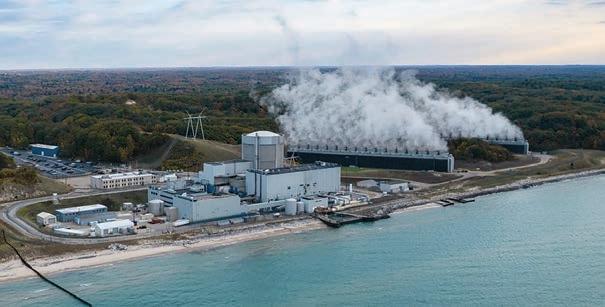
The funds in the budget Whitmer signed recently are contingent on “conditional commitments” from the U.S. Department of Energy, from which Florida-based Holtec is requesting a $1 billion loan.
The company went that route after the department, headed by former Michigan Gov. Jennifer
Granholm, rejected its application for $1.2 billion in credits through a new program created under the Bipartisan Infrastructure Law. The guidelines have since been revised to include plants that closed after mid-November 2021, but a Holtec spokesperson said this week it is “committed to our current path.”
Questions of condition
Edwin Lyman, director of nuclear power safety with the Massachusetts-based Union of Concerned Scientists, said reviving Palisades would depend on its condition at the time of the shutdown and how well it has been maintained since.
“There’s a question mark because if the utility is planning to shut it down, they’re going to be deferring costly maintenance with the expectation that they’re not going to be running the plant. I don’t think anyone knows how much deferred maintenance there is that’s going to end up being this bill for Holtec,” he said. “I think it’s a big unknown. We do know that the plant has several longstanding material degradation issues via control rod drives (that) have been leaky for decades.”
That problem led New Orle-
ans-based Entergy, which ran the facility for 15 years after buying it from Jackson-based Consumers Energy, to end operations 11 days early.
“It’s a very old plant,” Lyman said. “The reactor vessel is severely embrittled. ... I haven’t seen any serious estimate of what it would actually cost to return it to service safely. But chances are $150 million is certainly not going to cut it and maybe (not) even $1 billion. Until that happens in a transparent manner, I don’t see how the state can continue with its mindless advocacy. It could be really irresponsible. They don’t understand the condition of the plant anymore than anyone else does.”
Restart backers say it would support Michigan’s clean-energy transition by safely restoring 840 megawatts of carbon-free, baseload power that accounted for 4.4% of in-state electric generation.
“In a time when weather disasters are becoming more frequent and our energy grid is at best unreliable, we must do everything we can to ensure that Michiganders have access to safe, dependable energy resources,” Rep. Joey Andrews, a St. Joseph Democrat whose district includes the facility, said when legislators passed the
$150 million grant. “Repowering the Palisades Nuclear Plant is an economic investment with immeasurable benefits for generations to come.”
Whitmer’s support for reopening Palisades, along with Granholm’s statement in a congressional hearing that she was “hopeful” about the restart effort, is raising alarms among anti-nuclear organizations that want the facility to remain mothballed.
They cite safety and pocketbook issues, along with concerns over Holtec’s former CFO filing a whistleblower lawsuit alleging he was fired for refusing to mislead potential investors in the company’s planned underground nuclear waste storage facility in New Mexico. Holtec has said the complaint
WHY RELATIONSHIPS ARE THE FOUNDATION TO A CONSTRUCTION PROJECT’S SUCCESS
By Fritz Wahl eld Construction
When it comes to business operations, Fritz Wahl eld Construction (FWC) puts relationships rst. e company’s achievements over the last six decades have been driven by those relationships and the accountability of the entire FWC team. e owners play a vital role in the complete process of construction, from the pre-design phase to the nal inspections at completion.
construction projects on time and on budget,” said Dan Tryles, the director of Architecture at Kingscott Associates. “ ey are organized, excellent communicators, and do a nice job of working with clients to plan and then e ciently execute the project.”
subcontractors allows them to stay focused and ensure the right elements are in place for the project to thrive before it even begins.
is without merit.
If the plant reopens, it would be sixth-oldest of 94 reactors across 29 U.S. nuclear plants, according to a Crain’s review.
“It’s one of the riskiest reactors in the country, if not the world,” said Kevin Kamps, the radioactive waste specialist with Beyond Nuclear, an anti-nuclear group based in Maryland. It is critical of state and federal “bailouts” for Palisades. The plant had chronic problems, dating back decades, with control rod drive mechanism seals, Kamps said.
Holtec, which bought the plant to decommission it, has not publicly disclosed how much it would cost to bring it back online.
David Eggert is a reporter for Crain’s Detroit Business.
“As an owner of this company, staying actively involved in each project is essential to building a strong and direct foundation with our clients,” said Vice President Fritz Wahl eld III. “When that foundation is built and maintained over the course of many years, the people we work with become like family and are treated as such.”
With individual projects ranging from $100,000 to over $20 million, as well as total contracts exceeding $100 million and spanning multiple years, FWC has proven to not only be capable of completing a project, but also has the ability to maintain relationships that keep clients returning and subcontractors calling for more work.
 -
-
Because of the long standing partnerships they build and the core values behind them, FWC continues to remain a top contender for commercial construction management by having prospered with several diverse industries and projects of all sizes across West Michigan.
“FWC is dedicated to delivering quality


“Our company has worked with Fritz for more than two decades,” said Daniel Schepers, vice president at Schepers Brothers Co. “When you work with a company for that length of time and range of projects, you really get to know them on a personal level, as well as a business level.”
e success of a project is determined long before the construction starts. e tight collaboration FWC establishes between their clients, construction managers, architects and
“When the FWC sta calls to schedule work, we know it will be ready when we arrive, they will have answers or solutions to problems that pop up, and they will give us adequate time for completion,” Schepers said.
As Benjamin Franklin once said, “time is money.” Without the participation, cooperation and commitment of its owners, architects and subcontractors, FWC would not be able to operate successfully to meet the goals and budgets of its clients.
e company’s motto, “Building it Better”, exceeds the general scope of construction and extends to every facet of the business. eir mission to provide the nest construction services has stood the test of time, and the proof lies in the partnerships that have driven FWC to success.
Scan here to learn more about Fritz Wahl eld Construction or to contact them about a potential partnership.




August 21, 2023 | CRAIN’s gRAND RAPIDs BusINEss | 17
SPONSORED CONTENT
CRAIN’S CONTENT STUDIO
“FWC is dedicated to delivering quality construction projects on time and on budget.”
Dan Tryles, the director of Architecture at Kingscott Associates
Brookwood Elementary Gym Addition, Kentwood Public Schools | Credit: FWC
2023 Life EMS Innovation & Education Centre | Credit: Tippet Photo
2023 Townline Early Childhood Center, Kentwood Public Schools | Credit: FWC
Palisades Nuclear Plant in Covert Township on the shore of Lake Michigan. HOLtEC INtERNAtIONAL
Fourth-generation seating company takes on new identity
Irwin also unveils new products for postpandemic world



 By Kayleigh Van Wyk
By Kayleigh Van Wyk
After 116 years in business, a West Michigan seating manufacturer is repositioning for an evolving future in an industry that was deeply affected by the COVID-19 pandemic — starting with a new brand identity.

Last month, the former Irwin Seating Co. announced a rebrand that dropped “Seating Company” from the fourth generation, family-owned company’s name.
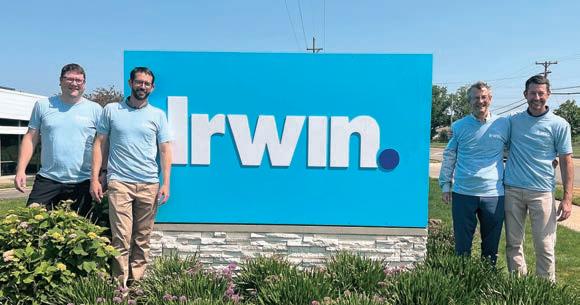
The Walker-based Irwin is long known for its fixed seating products for stadiums, arenas, theaters, performing arts centers and classrooms, all of which experienced widespread shutdowns amid pandemic safety precautions. Notable Irwin projects include seating for venues such as Little Caesars Arena in Detroit, Allianz Field in Saint Paul, Min n., Dickies Arena in Fort Worth, Texas, and Golden 1 Center in Sacramento, Calif. The company, which employs more than 500 people, has manufacturing facilities in Walker and Altamont, Ill.
However, the COVID-19 pandemic created some unique needs for venue and entertainment seating. Gatherings ceased during quarantine periods, and now the way in which younger generations of fans and attendees engage with venues might not include the same seating preferences as before, company officials say.
“I think Irwin was really impacted by the pandemic — I mean, we are in the business of public seating,” said Lisa Zabavski, the company’s vice president of marketing and insights. “People couldn’t gather anymore, and that’s all we support is places of gathering. … But we used that time to hunker down and start thinking about what’s next.”
With the rise of hybrid work schedules, hybrid learning in schools and other flexible ways of life, Zabavski explained how people are more accustomed to having options — and that translates
to where and when they sit at events.
“I think back with my generation, and we were OK sitting in a chair and watching an event from the beginning till the end, or when I was in school, we were OK sitting in a lecture from the beginning till the end,” she said. “Now, I think hybrid has become big with everything. Even when you look at event venues, (people) don’t just sit in their seat. There are many experiences that they’re wanting to explore while they’re there.”
According to a 2022 market analysis report from Grand View Research, stadiums in particular will continue to see a trend of fans looking to “gain something” from live experiences.
The report, which estimated the global stadium seating market at $1.74 billion in 2022, also details the growing requirement of flexible seating arrangements, leading to increased demand for options like folding chairs or telescopic, or retractable, seating.
Indeed, the venues have been catching on.
“There are some spaces and events that are standing room only now. … Part of the reason for taking the ‘Seating Company’ off is that we can help those spaces in different ways,” Zabavski said.

To fit with this evolution, Irwin already has started pivoting away from traditional stadium seating with the recent launch of Gathr, a freestanding folding chair that represents the company’s first venture into non-fixed seating options.
Gathr, which Zabavski said has been in the works for around two years, is designed as a convenient folding chair option that’s easy to carry and quick to open and close and aimed at places like arenas that need to quickly set up for concert floor seating.
Gathr was inspired by the notion of “what’s next” coming out of the pandemic period, she said.
“We’re really looking to understand more about the future and start thinking about how we become more of a thought leader and develop products, solutions and experiences for this next generation and kind of where the future’s going,” she said.
18 | CRAIN’S GRAND RAPIDS BUSINESS | AUGUSt 21, 2023
HERE COLLEGE OF BUSINESS PROFESSIONAL MBA www.gvsu.edu/seidmangrad • Earn your MBA in 22 months while working • Engage with a hands-on capstone consulting project • Tap into valuable community and business connections • Hybrid and remote learning options • Personalized leadership development • Exceptional faculty ON THE Stay Ahead of Industry News MAKE AN ANNOUNCEMENT! Debora Stein | dstein@crain.com
THE TRANSFORMATION BEGINS
Walker-based Irwin, now under fourth-generation leadership, has launched a rebrand and new products in the wake of the pandemic. From left: Andrew, Coke, Win and Graham Irwin. COURtESY OF IRWIN
Corium Innovations rebrands, looks to grow core business
Contract pharma manufacturer intends to pursue M&A acquisitions
By Mark Sanchez
Operating under new ownership and a CEO who joined the company early this year, Corium Innovations Inc. looks to grow with a focus on its core business.
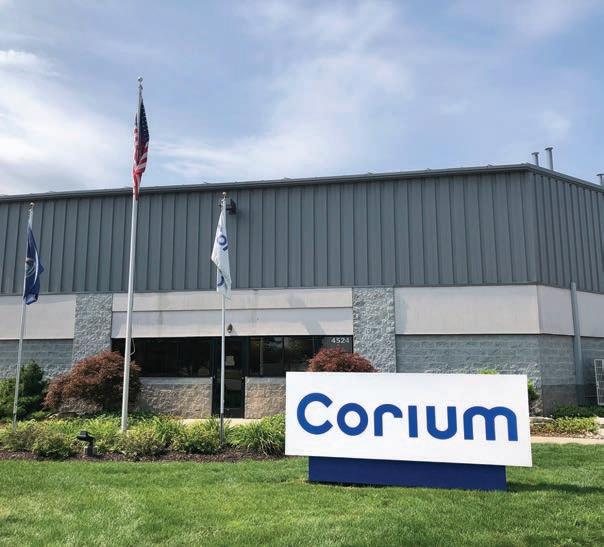
The recently rebranded Kentwood-based Corium Innovations also intends to pursue M&A to complement its transdermal patches for drug delivery via absorption through the skin.
The private equity-backed Corium Innovations is essentially “going back to its sort of roots” as a contract development and manufacturing company for the pharmaceutical industry, said CEO Mark Sirgo.

“Corium is alive and well. It’s back to its earlier knitting in the contract manufacturing space, but in a very innovative way,” he said. “It’s a very exciting time for the company.”
Sirgo joined Corium Innovations in January, three months after the company was split off from Boston, Mass.-based Corium International Inc. whose owner separated its contract manufacturing and product development units. The company, which dates back to 1995 in Grand Rapids, was previously known as Corium Pharma Solutions Inc.
Co-owned today by Waltham, Mass.-based Webster Equity Partners and Cambridge-based Gurnet Point Capital, Corium Innovations employs nearly 200 people

at three production and warehouse facilities on 50th Street, near Gerald R. Ford International Airport.
Corium Innovations produces Crest teeth-whitening strips for Proctor & Gamble and transdermal patches, including a once-weekly Adlarity patch for a generic drug to treat Alzheimer’s disease. Other patches are used with drugs to treat hypertension and also include a topical contraceptive.
The company is pursuing new business with pharma companies for drugs that can convert to topical applications using transdermal patches, Sirgo said.
“We dusted things off the first of the year, getting back into the CDMO business, and we’re out prospecting. We’re doing business development to secure contracts going forward,” he said in a recent interview with Crain’s Grand Rapids Business.
“There’s wide variety of products that can be applied transdermally, and oftentimes it’s just for the convenience and to assure compliance in conditions that might be chronic in nature where it’s easy for people to forget to take their medications on a regular basis,” Sirgo said. “We’re going through in a very systematic way all of the products that are in the market right now that might be amenable so that we can approach the manufacturer of that product. And, at the same time,
Motor repair company acquires Detroit center
Acquisition is Kalamazoo-based HECO’s sixth
By Kayleigh Van Wyk
A Kalamazoo-based motor repair and equipment management company is expanding to the east side of the state with the acquisition of a metro Detroit service center.
HECO Inc. executives earlier this month announced the acquisition of Alran LLC, an electric motor repair company located in Redford Charter Township near Detroit. Terms of the deal were not disclosed.
Established in 1959 as Hatfield Electric Company, HECO is a third-generation family business that helps industrial facilities adopt more dependable motors and equipment. The company is based in Kalamazoo and has various service area hubs in Michigan, Ohio, Pennsylvania and Kentucky.
Alran was founded by Allen and Randy Altman in 2005 with a similar focus on electric motor repair and rewinding services for industrial clients.
HECO President Justin Hatfield said the company has been
we’re looking at all of the products that are in clinical development where switching to a transdermal system might make more sense for these companies.”
Among the areas Corium Innovations wants to enter is microneedles that are used to deliver a new generation of biologic drugs that have recently come to the market and that are taken primarily by infusion or through a subcutaneous injection under the skin.
Microneedles embedded in patches represent an “enormous” opportunity, Sirgo said.
“That’s clearly the future in terms of contract manufacturing,” he said. “Over the last 15 years at least, you’ve had the introduction of all of these biologics that also have to be given by injection. It’s created an opportunity that’s visible now.”
A veteran pharma executive, Sirgo has more than 35 years of experience in the industry. He most recently founded and served as president, CEO and vice chairman of BioDelivery Sciences International Inc., a specialty pharmaceutical company in Raleigh, N.C., that’s focused on pain and addiction management.
In a January announcement on his appointment, Gurnet Point Capital partner Travis Wilson said Sirgo’s “decades of industry experience and proven track record of research, development, and commercialization of pharmaceutical
products make him the ideal leader for the next phase” of Corium Innovations.
Under Sirgo’s leadership, Corium Innovations rebranded and adopted the new name in June that gives the company “visibility as a cutting-edge manufacturer,” he said.
Corium Innovations’ growth strategy for the future includes pursuing acquisitions, Sirgo said.
The M&A strategy will focus on finding later-stage startups and mature companies to acquire and that have products that fit with Corium Innovations’ focus on
transdermal systems.
“We’re definitely looking at M&A and we’re definitely looking to really build upon our own capabilities internally right now,” Sirgo said. “We’re looking at companies that do those types of things that are very analogous to where our business is right now, but different enough that it gives us the diversity to be a major player in the topical delivery space.”
Sirgo hopes Corium Innovations can close its first acquisition by the end of next year and said “there’s not a lack of opportunities out there” for M&A.
on the hunt for additional acquisitions, but was actually approached by Randy Altman, who was considering retirement.
“They were looking for a partner to come in and (we) figured that we didn’t have a shop on that side of the state and that maybe we would be a good fit for them,” Hatfield said. “Everything worked out.”
Going forward, Alran will operate as HECO’s metro Detroit service center. Hatfield said HECO already has a variety of accounts in the area, so the new presence in metro Detroit — will be beneficial.
“We could only serve those accounts from Kalamazoo, so we couldn’t respond the way local providers could, and now we have that ability,” Hatfield said.
“It’s just a good mix of the local presence and Alran being very good at what they have done over the years and mixing it in with what we have.”
Hatfield also said Randy Altman will stay on for a few years as operations manager at the new service center before retiring.
August 21, 2023 | CRAIN’s gRAND RAPIDs BusINEss | 19
When that happens, Mika Meyers steps in with a depth of experience across practice areas. As an organization, we are understanding, relatable, and empathetic. We also know when to be aggressive and turn on the fight—so you can get the best results possible.
LITIGATION AND DISPUTE RESOLUTION
get you. We’ve got you.
Some disputes simply can’t be resolved without resorting to formal legal proceedings.
We
mikameyers.com
Corium Innovations headquarters in Kentwood. | MARK sANCHEZ, CRAIN’s gRAND RAPIDs BusINEss
Pioneer plans up to 1.4M sq. feet of industrial property
U.S. 31 between New Holland and Ransom streets.
By Kate Carlson
Pioneer Construction Co. aims to boost the supply of much-needed industrial property along the lakeshore.
The firm is working to develop a 77-acre property in Holland Township with the capacity for 1.4 million square feet of industrial real estate, which is nearly double the amount of currently vacant industrial square footage in the region, according to a recent market report.
Doing business as Holland Industrial Development LLC, the Grand Rapids-based construction firm purchased the property from West Ottawa Public Schools on May 12 for $2.9 million, according to property records. The school system previously planned to expand on the parcel, but the project never came to fruition. The property is located just east of
“We’ve done quite a bit of industrial construction over the years, and we think there is strong industrial demand across the West Michigan market and a lack of development-ready inventory for large industrial users,” said Chris Beckering, executive vice president of Pioneer Construction. “We’re currently in the process of doing further due diligence and engaging with potential users who have interest in the site.”
Indeed, industrial vacancy
2023, with 787,468 square feet of vacant industrial property, according to NAI Wisinski of West Michigan’s industrial West Michigan Market Report.
The lakeshore region captured in the report spans the city of Muskegon down to Saugatuck.
“This is one of the last, large vacant parcels available (in Holland Township), and to see that being utilized in the manner the township’s future land use plans for is exciting,” said Holland Township Manager Steve Bulthuis.
Pioneer could pursue a couple of paths for the site, including
250,000-square-foot building as part of the multiple-building proposal, he said.
Given companies’ stated interest in moving to the site, Pioneer would likely build a project that caters to the future user or users’ needs, Beckering said. The company would also consider building a speculative project if it’s unable to find a user soon, Beckering added.
do large-footprint buildings on a development-ready parcel.”
The property was rezoned from agricultural to industrial, and also has utility access.
The site is bisected by two drains, and Pioneer is currently working with the Michigan Department of Environment, Great Lakes and Energy to relocate one of the drains, Beckering said.
rates remain low across the region as the supply of developable land remains tight.
The industrial vacancy rate along the lakeshore was at 1.4% during the second quarter of
constructing a single, 1.4 millionsquare-foot building, or several buildings totaling about 1.4 million square feet, Beckering said. The company has site plan approval to construct a
“We’re really looking to bring to market a high quality industrial product with higher ceiling heights, more efficient lighting systems and a higher grade fire suppression system,” Beckering said. “The real attraction is the ability to
Pioneer plans to have the drain relocated along with other site work completed in time to start construction next year, Beckering added.
Pioneer Construction is working with NorthStar Commercial LLC to market the project.

20 | CRAIN’S GRAND RAPIDS BUSINESS | AUGUSt 21, 2023 Nominate a leader in health care or health care insurance who has made an impact in their institution and community. Leaders can come from areas such as administration, clinical, research, nursing and more. Nominations Due September 8
Site would more than double amount currently available in Holland to wnship
Pioneer Construction could build up to 1.4 million square feet of much-needed industrial real estate near U.S. 31 in Holland Township. The land was previously owned by West Ottawa Public Schools, which planned to use it for an expansion project that never came to fruition. COURtESY OF PIONEER CONStRUCtION
“This is one of the last, large vacant parcels available (in Holland Township), and to see that being utilized in the manner the township’s future land use plans for is exciting.”
Steve Bulthuis, Holland Township Manager
Sports complex closer to kickoff with $1M lead gift
Meijer donation sparks other contributions from big-name donors
By Rachel Watson
The fundraising campaign for an $11 million expansion of the Meijer Sports Complex near Rockford has passed the halfway point thanks to a lead gift from Meijer Inc. that spurred pledges from other bigname donors.
The West Michigan Sports Commission earlier this month announced the Winning Streak for West Michigan capital campaign has reached $5.8 million, or 53% of its $11 million goal, thanks in part to a $1 million gift from Meijer that the WMSC leveraged to secure other pledges.
The WMSC launched the capital campaign in October to expand the complex that it opened in 2014 at 3300 10 Mile Road NE in Plainfield Township at a cost of $7.5 million. The facility has eight baseball and softball fields, a championship baseball field and the Nate Hurwitz Miracle League Field.

The expansion will be on acreage south of the complex and will include a new championship softball field for youth, amateur and collegiate softball featuring synthetic turf, grandstands, lighting, covered dugouts and a press box. The project also calls for three flexible-use diamond fields for youth and ama-
teur baseball and softball as well as collegiate softball, with covered dugouts and bleachers; 20 pickleball courts, including a championship court; a new concession building, new restrooms and expanded storage; a new playground area; canopies over all the bleachers; synthetic turf installed on the existing championship baseball field; resurfacing the Miracle Field; and 300 additional parking spaces.
Grand Rapids-based Progressive AE Inc. is the project’s architect. A contractor has not been officially selected but a spokesperson for WMSC said it’s likely that Grand Rapids-based Owen-Ames-Kimball Co., the general contractor for the initial project in 2014, could be selected to complete the expansion.
Initial construction will begin this fall with the funds raised thus far, and continue next year as more funds come in.
The initial phase will include installing the synthetic turf, resurfacing the Miracle Field and adding 300 parking spaces. Work on the new softball field will begin in early 2024.
Palm Beach Gardens, Fla.-based Sports Field Partners Inc. will install the synthetic turf.
Meijer President and CEO Rick
Keyes said in a statement that supporting youth and amateur sports in West Michigan is one of the Walker-based retailer’s key community engagement priorities.
“That is why we have partnered with the WMSC for more than a decade on everything from the State Games to the naming of this community staple,” he said. “We’re honored to help the Meijer Sports Complex continue providing a safe place for young people of all abilities to play, now and into the future.”
WMSC President Mike Guswiler said in a statement that the group is “so grateful” for Meijer’s generosity.
“Equally important, we were able to leverage that gift when speaking with others in the public and private sectors to demonstrate the importance of the project and motivate others to give,” Guswiler said.
The donors who pledged in response to Meijer’s gift include the Secchia Family Foundation in memory of WMSC founder Peter Secchia, the DeVos Family Foundation, Jandernoa Foundation, UFP Foundation, Mercantile Bank, Lacks Enterprises, Mary Free Bed Guild, Reagan Marketing and an anonymous donor. The WMSC


board and Winning Streak campaign cabinet also contributed.
The amounts each donor gave were not disclosed.
The Kent County Board of Commissioners in December also allocated $1 million in federal American Rescue Plan Act (ARPA) dollars to the project.
U.S. Rep Hillary Scholten, D-Grand Rapids, requested the House Committee on Appropriations earmark $750,000 in Community Project Funding for the project in the 2024 state budget, but the fate of that request is uncertain.
To date, the Meijer Sports Complex has attracted 148 travel events, 7,500 teams and 243,750 visitors, for a total economic impact for
Kent County of $52 million in direct visitor spending, according to the WMSC.
The expansion will help WMSC accommodate 200 more teams annually and generate an additional $1 million in annual visitor spending, the group said.
“The Meijer Sports Complex fills a critical need for championship-caliber infrastructure for sports like baseball and softball in West Michigan, and the demand for this kind of space that also offers gender parity with softball diamond fields has only increased,” Guswiler said. “We’re excited to take the complex to the next level for athletes playing everything from baseball and softball to pickleball.”
August 21, 2023 | CRAIN’s gRAND RAPIDs BusINEss | 21
The West Michigan Sports Commission has passed the halfway mark of an $11 million capital campaign to expand the Meijer Sports Complex near Rockford. | PROgREssIVE AE INC.
Celebrating and learning from human resources pros

The workplace has received more attention in the past three-plus years than at any time I can remember. Much of it sounds all-too-familiar: the pandemic, the great resignation, quiet quitting. The challenges and stresses workers face has been the primary focus, and understandably so.
But there’s another group of professionals who are often in the background working diligently to ensure that businesses and other employers keep serving their customers, despite the internal challenges. They are our human resources professionals.
Often they are the unsung heroes who are recruiting to fill the gaps, striving to keep up morale and ensuring existing staff have the training they need to thrive.
Earlier this month, we honored a large group of them at the annual Crain’s HR Summit. Throughout a morning filled with great energy and conversations, we handed out our annual Excellence in HR Awards to recognize professionals who are doing exceptional things during these extraordinary times. We also heard top HR executives from across Southeast Michigan discuss how they are navigating today’s
challenges.
Whether they’re attempting to curb absenteeism on Mondays with special activities and free popcorn or using new technology to recruit younger workers, it became clear pretty quickly that these are the folks who are constantly striving to keep the team whole so the work can get done.
Add on top of that the increased attention mental health in the workplace has received since the pandemic. Certainly, mental health issues have long been with us but the increased awareness, not to mention stress, highlighted by the pandemic has added a layer of complexity in the workplace.
According to a study released this spring by the Society for Human Resource Management, one-third of U.S. workers say their job has negatively impacted their mental health in the past six months. And there’s a generational divide with higher percentages of millennials and Gen Z workers reporting that their jobs cause them stress.
It is within this dynamic environment that HR professionals must navigate.
As someone who is newer to Crain’s, another aspect of the HR Summit that I appreciated was the sense of community at the event. To see a group of dedicated professionals who, dare I say, at times may feel underappreciated, come together for a few hours to learn and celebrate was fulfilling.
I witnessed another sense of communi-
ty earlier this year at our Women Who Mean Business Power Breakfasts that were held in both Detroit and Grand Rapids. While those were not industry-specific events, the collection of professionals who gathered to lift up each other was truly inspiring.
Now, the HR Summit has me really looking forward to our Grand Rapids Power Breakfast in September where the topic will be mental health in the work-
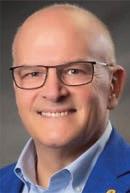
place. It’s a weighty but important topic. (In Detroit, our next Power Breakfast will focus on electric vehicles, which will be timely and interesting in its own right).
Events like these can help us all stay better connected as people and professionals. And, in the case of the HR Summit, shine a light on essential professionals who often serve in the background yet deserve our thanks for all they do to keep our workplaces on track for success.

The future of banking in Michigan requires diversity
The state of banking in Michigan is still strong in the community banking space, comprised largely of small and mid-sized banks. I use the term “strength” in terms of financial strength and ability to help clients in what are very challenging times for all businesses, particularly small and mid-sized ones. All businesses face headwinds — from a rapidly rising and volatile interest rate environment to continued issues in finding employees. Contrary to popular belief, bankers — and their shareholders — have to be optimists because sometimes the world feels like if it can go wrong, it will. Community bankers who live, play and work in their communities know their financial health is largely tied to the community’s fiscal health. To be clear, like everyone else, bankers can be good, bad or indifferent, but most of us understand that our interests are directly tied to helping consumers and small businesses in our communities.
In short, we have a strong motivation to support clients regardless of community spirit. Bankers also know, unlike some politicians, that there are only two states of being in business: growing or dying.
You might be scratching your head now, because it seems like a lot of self-proclaimed smart people in the investing world seem to have or have had issues with some banks’ performances. I think Wall Street, rightly so, has issues with companies in virtually every industry but that does not mean the entire industry sector is bad. Not to pick on any one company, but Facebook is still down 37% from their high in September 2021, so companies can fall out of favor even if investors believe in their overall business models. Banks are no different, with some deserving skepticism and all of us subject to economic forces that can’t be remedied overnight.
I believe in the banking space most of the distrust or unhappiness has been with relatively large banks. Unfortu-
nately, or maybe luckily, in Michigan, we don’t have any of those headquartered here, although they certainly have a high market share in their offices locally. My understanding is the issue for Wall Street really has been about perceived stability and expected financial performance.
One concern is whether some of these large banks are able to retain enough of their depositors with interest rates going up 161% in a very short amount of time or make money if economic volatility continues?
Community banks do experience the same issue although less severely because their depositors largely value stability more than a few more dollars of interest and want “their” bank to be there to help and support them over the long-term.
Community banks appear to actually be better at diversification than large banks even though smaller banks have a much smaller geographical footprint. Small-and mid-sized banks are generally well aware they can’t survive having too much concentration in any one industry, client, product or interest rate position.
Concentration is a broad term and applies to many aspects of banking. For ex-
ample, having too many long-term securities can impact a bank’s capital reserves if rates go up swiftly like they did this year. Or having too many loans to an industry out of favor because of real or perceived economic headwinds. As community banks, we generally don’t paint with a broad brush, meaning we don’t turn down prospective loans solely because they are operating in a riskier industry or business. Instead, we analyze every client or prospective client based on their particular situation and problem to solve.
Businesses and consumers can often avoid trouble when they realize their limitations on predicting the future and instead work to be in a sustainable position regardless of what happens. Diversity is a good strategy across most aspects of this business. It isn’t always comfortable giving up gain today for a better tomorrow, but that is a proven way consumers and businesses create value for themselves.
22 | CRAIN’S GRAND RAPIDS BUSINESS | AUGUSt 21, 2023 Sound off: Send a column for the Opinion page to tim.gortsema@crain.com. Please include a phone number for verification purposes, and limit submissions to 500 words or fewer. Please include a headshot, title and organization name with the submission.
COMMENTARY
David Lamb is chairman, president and CEO of Oxford Bank and its parent company, Oxford Bank Corporation, headquartered in Oxford, Michigan, and operating continuously under local ownership and management since 1884.
COMMENTARY
Community banks appear to actually be better at diversification than large banks.
Mickey Ciokajlo is executive editor of Crain’s Grand Rapids Business and Crain’s Detroit Business.
Attendees listen to a panel of human-resources experts at Crain’s HR Summit. | BREtt MOUNtAIN/CRAIN’S DEtROIt BUSINESS
costs at the time, paired with the city negotiating deals via eminent domain.
The urban renewal process drew criticism from some observers for replacing old buildings with mostly all modern architecture.
Work was set to begin in 2019 to add more amenities to the concrete plaza, including a splash pad, public restrooms, streetscape enhancements, a playground, pavilion, games court, more green space and landscaping, as well as improving pedestrian access to the area.
The project never got off the ground and was then paused by the COVID-19 pandemic, said Bill Kirk, communications director at DGRI. Additionally, the project’s steering committee also learned that the city was set to resurface the whole plaza in the spring of 2026, so it would not make sense to start construction on the plaza before it would be torn apart and resurfaced by the city a few years later, Kirk said.
The estimated cost of resurfacing and waterproofing is around $10 million, which does not include some of the other features that DGRI will likely add to the project, said Steve Prins, director of facilities and fleet management for the city of Grand Rapids.
However, completing the projects together will reduce the overall costs by maintaining one contractor and aligning the plans, Prins said.
Responding to common questions the city has received about the renovation project, Prins said La Grande Vitesse will remain in place during construction.
The sculpture has footings that are rooted in the parking structure underneath the plaza, so it has to stay in place and will be protected during construction, Prins added.
“The last time this resurfacing and waterproofing was done was in 1987-1988,” Prins said. “It will be 38 years old by the time it’s replaced.
Our No. 1 focus at the beginning was replacing what is there exactly as it is, but now we can also put in some different features that are being discussed as part of this (Calder Plaza master plan).”
Because of the overlapping construction plans, DGRI is rethinking the timeline of its Calder Plaza master plan once more. The organization plans to add the new amenities to the area in tandem with the city’s resurfacing project, said Mark Miller, managing director of planning and design at DGRI.
Officials plan to bid out the project in July or August of 2025 and be ready to start construction as soon as the weather allows in 2026, Miller said. DGRI is continuing to work with Progressive AE Inc. as a consultant on the project, Miller said.
“The goal would be to have (the plaza) completed by November 2026,” Miller said. “We don’t want it offline for more than that period of time, but there are a lot of details to work out.
This is actually a great opportunity because instead of piecemealing this over three or four years, we can have a lot more impact and do the construction all at once.”
The master plan that DGRI adopted for the plaza in 2017 will still serve as the guide to improving the plaza, but because so much time has passed, certain elements are being re-evaluated, Miller said.
For example, an elevator connecting the parking decks to the plaza was part of the master plan, but the city is currently constructing an elevator similar in design at the plaza, which should be completed by the end of this year, Miller said.
Improvements to the plaza will include adding electric access that will make it easier for events and food trucks to connect to. Planners also hope to “green up” the plaza for everyday users, Miller said.
Adding more landscaping and green space is “an important piece” of the project that they will incorporate while working with other partners that currently have been using the space for events, Miller said.
“When it’s all said and done, we want to have two things happening: Still have the capacity to have big events, but also when no events are happening, we want the plaza to be usable and inviting to the general public to hang out and have lunch at,” Miller said. “We want this to be a space comparable to Rosa Parks Circle, where people are still hanging out there when there isn’t a scheduled event going on.”
BANKS
From Page 5
customers beginning to draw more on existing lines and borrow more for expansion of their businesses,” according to the corporation’s quarterly earnings report issued on July 27.
At Grand Rapids-based Mercantile Bank Corp. (Nasdaq: MBWM) commercial lending remained “strong” in the second quarter and grew at an annualized 6% rate, said Chief Operating Officer and bank President Ray Reitsma.
The bank’s commercial loan growth in the second quarter “occurred entirely” within the commercial and industrial segments, Reitsma said. Lending for commercial real estate projects has “been essentially level as projects have been paused to evaluate the impact of demand dynamics and higher interest rates,” he said.
Even with flat lending volumes for commercial real estate, Mercantile Bank’s commercial pipeline ended the second quarter at all-time high of $678 million, Reitsma said.

The quarterly growth rate came as “new funding volumes weighted more heavily toward the latter part of the quarter in June outpaced loan payoffs, which had been meaningful over the last several quarters,” said Mercantile President and CEO Robert Kaminski Jr.
In a conference call with brokerage analysts, Kaminski said Mercantile’s commercial loan pipeline across the bank’s markets in the Lower Peninsula “remains at a very high level.” The bank projects 5% to 6% commercial loan growth for all of 2023.
“Customers generally report solid sales opportunities, although occasional challenges remain in the marketplace, along with concerns about the threat of a reces-
sion in view of the continued tightning of interest rates,” Kaminski said.
The solid growth rates the publicly traded local banks recorded for commercial lending through the first half of the year occurred despite rising interest rates and even as economists generally continue to forecast a mild recession beginning in late 2023 or early 2024.
Paul Isely, associate dean at Grand Valley State University’s Seidman College of Business, attributes the solid commercial lending growth to good earnings at local businesses and a need for the manufacturing sector to invest.

The labor shortage and resulting higher labor costs have led many manufacturing businesses to invest more in automation, Isely said. Automotive suppliers are retooling as the industry electrifies and new electric vehicles come on the market, he said.
“They’re launching a ton of new product over the next few years in order to move into the EV world. That requires a lot of investment to make that adjustment,” he said. “So, you would expect there to be a lot of investment here in West Michigan to facilitate that stuff.”
As some national outlooks point to a mild recession on the horizon, Isely and others continue to believe that Michigan, particularly West Michigan, will fare comparatively better. He believes the region may even avoid a recession altogether.
“We are still showing strength in all of the sectors that would have to fall,” he said. “Overall, things will stay pretty strong here.”
For instance, the local automotive and aerospace industries remain in good shape, although office furniture has seen weakness, Isely said.
Nationally, Isely expects a “light” recession in the U.S. before the end of 2023, as higher interest rates take their toll.
PEOPLE ON THE MOVE
To
BANKING & FINANCE
Dan Carter Advisors Mike Volk, CPA, CVA, with the firm of Dan Carter Advisors, has successfully completed the certification process with the National Association of Certified Valuators and Analysts (NACVA) to earn the Certified Valuation Analyst (CVA) designation. In addition to valuation services, he also provides fractional/interim CFO services. Mike has spent over 22 years as a CFO and over 35 years as a financial leader. Dan Carter Advisors is a CPA firm focused on tax, small business, consulting and valuation.
CONSTRUCTION
Rockford Construction
Rockford Construction, a nationally recognized construction, real estate development and property management firm, announced an expanded leadership role for Monica Steimle-App. Steimle-App, who has served as a senior vice president since 2019, will lead business development and community efforts for all Rockford’s markets and services.

In this increased capacity, Steimle-App will focus on advancing Rockford’s presence and impact in its communities, with a focus on the Grand Rapids region.
As widely expected, the Federal Reserve Open Market Committee last month implemented another 0.25-point increase in the federal fund rates, continuing the hikes that have been occurring for more than a year to ward off high inflation.
Economists at PNC Bank expect that the FOMC will now pause increases and maintain the benchmark federal funds rate at its present level into early 2024. However, “if the job market remains hot or if inflation doesn’t slow, the committee is likely to hike again later this year,” PNC economists wrote in an economic brief following the latest rate increase on July 26.
Despite 2.4% Real GDP growth in the second quarter, rate increases are “now decisively weighing on growth” in the U.S. economy, PNC economists wrote.
“The most likely outcome is a mild recession late this year or early next, as the drag from higher interest rates accumulates. But there is still a 40% chance that the economy avoids near-term recession,” PNC said in a separate economic briefing on July 27.
At the Federal Reserve, Chairman Jerome Powell said following the July FOMC meeting that staff members are no longer forecasting a recession, although “it’s a long way from assured and, you know, we have a lot left to go to see that happen.”
Powell acknowledged that credit conditions for consumers and businesses are “tight and getting a little tighter” and loan demand has softened across the country. Despite the high-profile bank failures earlier year, the U.S. banking industry “remains strong and resilient,” he said.
Growth rates for commercial lending at banks based in West Michigan fared comparatively better than their larger, regional bank competitors that operate across several states and have a large local market presence here.
CONSTRUCTION
Wolverine Building Group
Wolverine Building Group, a leading construction firm headquartered in Grand Rapids, Michigan, has announced the promotion of Kurtis Fritz to Director of Construction, focused on the multi-unit residential market. Since joining Wolverine in 2018, Fritz has led several iconic projects for Wolverine, most notably the award-winning hotel at 10 Ionia. Fritz is spearheading multi-family projects across the region, including projects in downtown Brighton and Ypsilanti with WBG’s three offices.
August 21, 2023 | CRAIN’s gRAND RAPIDs BusINEss | 23
Advertising Section
Plaques • Crystal keepsakes Frames • Other Promotional Items CONTACT NEW GIG? Preserve your career change for years to come. Laura Picariello Reprints Sales Manager lpicariello@crain.com (732) 723-0569
place your listing, visit https://www.crainsgrandrapids.com/people-on-the-move/ or, for more information, contact Debora Stein at 917.226.5470 / dstein@crain.com
CALDER From Page 1
commitment, yes, but the city dragged its feet for years on what enforcement would look like. There was so much confusion around the city’s policy that it took this long to figure out. We were unclear what the hell we were supposed to do. So now we’ve got to pay a portion of our sales? There is no businessperson that would sign up for this if they knew ahead of time.”
The city says the fine and nonprofit arrangement is innovative and just to offset decades of negative marijuana laws. But industry representatives say the system is unnecessarily cumbersome and puts further risk on operations under rules that don’t apply to any other sector.
Municipalities across the country were encouraged by state governments to create cannabis-related programs to regulate businesses and fund social equity, a sort of mea culpa from drug laws that often discriminated against underprivileged and minority communities.
Grand Rapids established the Cannabis Justice Workgroup to handle the creation of its program, and in July 2020 it recommended that the City Commission approve the formation of the nonprofit Community Reinvestment Fund to carry out its equity goals. But the pandemic derailed those plans and the fund wasn’t
HOUSING
From Page 1
time whether to continue the fund.
“We are actually going to be working with our regional partners to try to raise additional money to go into the loan fund so that we can grow it even more,” he added.
Board chairperson Stan Stek said in a statement that the fund “will be transformative for Kent County families who desperately need more affordable housing options.”
He said the Aug. 10 vote was only to establish the fund, and the board will vote on the creation of an advisory committee to govern allocations at a future date.
A resolution included with the board’s agenda spells out the fund’s parameters:
w Rental projects will be priced for households earning at or below 80% of the countywide area median income (AMI), which is currently $71,600 for a family of four in Kent County.

w Homeownership projects will be priced for households earning at or below 120% of the countywide AMI, which currently is $107,400 for a family of four.
w All projects will be required to maintain affordability requirements for at least 20% of the housing units for a period of at least 10 years or the length of the loan period, whichever is longer.
Additionally, the resolution includes two “aspirational” goals:
w Homeownership projects will comprise 10% of all units approved.
w Sixty percent of the units ap-
created until February 2022.
The penalties associated with noncompliance of equity agreements and donations will make up the nonprofit fund, said Ciarra C. Adkins, the interim director for the city’s office of equity and engagement.
But even though enforcement is now ongoing, how much the city is collecting from fines and where it will be distributed has yet to be decided.
“These are conversations we’re actually having with the board right now,” Adkins said. “Those are some big decisions for the board to make. We think this is an innovative opportunity to support communities of color, knowing there have been historic harms.”
Williams takes offense to the entire fund as the company al-
“It’s misplaced. It’s not individuals in the cannabis industry that overpoliced or enforced redlining or housing discrimination in the city. It was the government. I fundamentally have a problem with this only being an albatross on the neck of the cannabis industry. It doesn’t mean we can’t have an impact in the areas of focus. That board takes our money and then decides where it goes. I want to see our dollars going into the areas we serve. I care about the 49507. They need to show me their commitment to the 49507.”
There are also larger questions afoot about how the fund will progress and the social equity fines will be imposed, said Paul Albarrán, associate attorney for Grand Rapids-based law firm Varnum LLP.
counsel and increased expenses without even knowing exactly what the city wants.
“There’s a lot of info we need to provide, which for larger companies is very tough to do,” Albarrán said. “We’re not even sure what information we need to provide to the city to prove employees are below the poverty line or whether they’ve had a drug conviction. That’s difficult, and I’m not sure the city has a robust enough guidance in terms of what they need to prove these things. We try to meet them as best as possible, but it usually ends up with a lot of back and forth with the city. It’s just onerous and requires a lot of communication. There is no other industry that has to operate under this type of scrutiny.”
to sell its business, those equity rules would transfer to the new ownership, at least 25% of which must live in Grand Rapids.
Even though medical marijuana is less profitable under current market conditions, Fluresh must maintain its medical licenses as it is allowed to grow under the medical licenses and transfer some of that product to the recreational market.
Fluresh has yet to receive the $60,000 bill from the city. It is only required to pay the fine for three years unless it comes under compliance sooner. The city’s recreational marijuana fines would be paid in perpetuity unless something else is negotiated.
ways intended to support disadvantaged communities, especially those near its operations on the city’s south side, including the neighborhoods of Burton Heights, Garfield Park, the Madison area and Martin Luther King Park.
Now it has no choice in where those dollars go, she said.
“When the city asked me about this (nonprofit fund), I told them it wasn’t a good idea,” Williams said.
proved will be leased or sold to households earning 80% or less of the countywide AMI.
During the public comment period of the meeting, eight county residents voiced support for the affordable housing revolving loan fund, but several also noted that the proportion of funds dedicated to increasing homeownership is not high enough.
Ted Hartzell is leader of the housing team for Together West Michigan, a coalition of 19 community organizations representing 18,000 citizens across the region.
He expressed disappointment that the board did not adopt his organization’s “50 by 50” proposal, which called for 50% of the housing units created by the fund to be owner-occupied by the 50% mark of the fund, or within 15 years. He said this would help Kent County residents build generational wealth and stability.
“Surely, Kent County in some fashion ought to keep before itself the guiding light goal of increasing homeownership steadily through the life of this unique and consequential fund,” he said during the meeting.
He noted that the 2023 Kent County Housing Needs Assessment found that of the nearly 35,000 additional housing units that will be needed by 2027, twothirds of the demand would be for owner-occupied units.
Spencer reiterated that the 10% of the fund that’s set aside for homeownership is just an “aspirational” number, and the committee plans to shoot for an even higher target
“Look, when the city started this whole program, I don’t think anything was done with bad intentions; the underlying intentions are similar all over the country — make sure the money goes back to the community,” said Albarrán, who represents several cannabis companies in Grand Rapids. “The problem really comes in when it’s as robust as Grand Rapids put together. We see this often, a really good idea with an implementation of that good idea becoming a problem.”
Albarrán said the equity program compliance requires a lot of expensive effort that usually requires companies to hire outside
Cities, including Detroit, do impose community benefits agreements on companies expanding, but those are usually linked to tax breaks, not fines imposed for noncompliance.
Adkins said the back-and-forth communication is a benefit to the companies as the negotiations often lead to reduced fines and less punitive measures.
Albarrán agrees but said the administrative burden often outweighs the benefit.
“All this interplay makes it very difficult for these businesses doing what they do best,” he said.
Williams said the failure of the plan is in its lack of contingencies. The social equity agreements are tied to the land, not the company. So if a marijuana company looks
“I can’t think of any other business that has these types of restrictions,” Williams said. “People are going to end up suing. The rules were changed in the middle of the game. We had no idea what the compliance punishment would be until years later. There is no sane businessperson who would sign up for this. The way this has been rolled out is very disappointing.”
Adkins, however, believes the city is just in its enforcement and that its nonprofit fund program will be a model for others.
“There are going to be organizations that don’t support this or believe in this,” Adkins said. “We believe, in the city of Grand Rapids, this is the right thing to do, so this is why we took this action.”
Dustin Walsh is a reporter for Crain’s Detroit Business.
Next; and Brad Kessel, president and CEO of Independent Bank. VerWys said during the meeting that he appreciates that homeownership was always looked upon as a “central part of the vision” for the loan fund.
“I appreciate the support from Together West Michigan, pushing that even further into our focus,” he said. “I am hopeful that this will be a transformational investment in our community. We want this community to be a place where people of all walks of life can belong and have a place and have a stake in this community.”
and review the goal continually.
“It doesn’t preclude IFF from providing loans for up to 60% of projects being homeownership — it’s really more aspirational at this moment that it will comprise 10% homeownership and 90% rental, but we want to hit that 10% goal and then keep increasing that percentage because that’s part of what we need in our region,” he said.
Hartzell also called for more transparency surrounding decisions about the loan fund, as the parameters and terms of the agreement were drawn up during a closed work session.
“We feel it was a violation of public trust for the (12)-member advisory committee to create this document behind closed doors,” Hartzell said. “We urge openness from this point on. Openness and trust will be vital for a fund that will start at $58 million and could reach as high as $200 million.”
It was not clear where Hartzell obtained the $200 million figure.
According to a memo included with the meeting agenda, the revolving loan housing fund advisory committee included three elected officials: Board of Commissioners Vice Chair Emily Brieve and commissioners Dan Burrill and Stephen Wooden.
It also included three county staff members: Spencer; Administrator Al Vanderberg and management analyst Sandra Ghoston‐Jones.
Community members on the committee included Ryan Kilpatrick, lead consultant with Housing Next, owner of Flywheel Community Development Services and senior program adviser of the DeVos Family Foundation’s Facing Home Initiative; Brooke Oosterman, director of policy and communications for Housing Next; Ryan VerWys, president and CEO of ICCF Community Homes; Monica Steimle‐App, senior vice president at Rockford Construction Co.; Eureka People, president of Housing
Oosterman told Crain’s Grand Rapids during the Aug. 9 Grand Rapids Policy Conference that she is eager to see the revolving loan fund move forward and begin allocating awards.
“What I’m really excited about is that impact investment amount,” she said after a presentation at the conference. “So when you look at the local investment of $17.5 million into the fund, that already is a really big deal, but the fact that it leverages additional dollars and creates $58.3 million of impact, through this partnership that’s been identified with IFF, that’s a huge opportunity for us — the solidifying of that partnership.
“Once details like this are shored up, we can start moving forward and start pushing projects through the pipeline, get that financing out the door and see new units come online.”
Crain’s Grand Rapids Business reporter Kate Carlson contributed to this report.
24 | CRAIN’S GRAND RAPIDS BUSINESS | AUGUSt 21, 2023
CANNABIS
Page 5
From
“I can’t think of any other business that has these types of restrictions.”
Shoran Reid Williams, general counsel for Fluresh
The 2023 Kent County Housing Needs Assessment found that of the nearly 35,000 additional housing units that will be needed by 2027, two-thirds of the demand would be for owner-occupied units. | NEXt DOOR PHOtOS
with job loss, not job gain,” Kelly said. “Manufacturing, as you look around here (in West Michigan), tends to be extremely conservative and very slow to adopt. They’re a ‘show me’ kind of people, right? And we were saying, but if you wait to see when to act, you will have missed the opportunity. So I refocused our mission 100% around being Michigan’s Industry 4.0 knowledge center.”
At the same time, Kelly said Automation Alley also is working to change that traditional narrative around automation, especially as manufacturers continue to grapple with labor shortages.
“It’s not about that robot taking the job of a person … there are no people. The biggest complaint in manufacturing right now is: ‘I can’t find enough people,’” Kelly said. “We’ve peaked with labor — we’re going to stay flat, maybe trend almost on the flat line. But GDP’s going to go up. So, if we want to grow but labor’s going to stay on that straight line, the only thing we can do is automate.”
U.S. Sen. Gary Peters, D-Michigan, last month reintroduced legislation — known as the Workforce Data for Analyzing and Tracking Automation Act — to evaluate the effects that automation has had on the manufacturing sector to help
inform workforce development strategies. With support from the Michigan Manufacturing Technology Center (MMTC), the legislation would authorize the U.S. Bureau of Labor Statistics to measure job displacement, the number of new jobs created and the shifting of in-demand skills.
“Accurate and reliable data is a real cornerstone of advanced man-
bots, artificial intelligence, cloud computing, internet of things (IoT), and other technologies.
The annual show brings cutting-edge technology, solutions and various industry experts to the venue’s full 180,000 square feet of space.
New this year was a dedicated Industry 4.0 pavilion coordinated by Automation Alley, the Michigan Manufacturing Technology Center
officials have established a goal to prepare 50% of all Michigan manufacturers — about 6,200 businesses — to adopt Industry 4.0 measures by 2025.
This effort has been supported by initiatives such as the Michigan Economic Development Corp.’s Industry 4.0 Technology Implementation Grant program, which reimburses 50% of qualifying technology costs — up to $25,000 — for eligible Michigan manufacturers.
turing on Demand. The organization bought and distributed 300 production-capable printers to 300 small manufacturers, teaching them how to use the printers and help transition to a digital mindset through 3D printing.
From Page 1
plants across the U.S. and Canada that LG is aggressively investing in to build capacity and supply chains for automakers that are launching electric vehicle lines, Automotive News reported. Once up and running, which is expected by mid-decade, the eight plants would have a combined 300 gigawatt-hours of electric vehicle battery production capacity.
Of those eight sites, Holland and an Arizona facility are the only two solely owned by the company, while the rest are joint ventures with major automakers. The projects represent nearly $27 billion in combined investment between LG Energy Solution and its automaker partners, which includes General Motors, Stellantis, Honda and Hyundai.
“As LG Energy Solution continues to expand in North America, the Holland facility is on track to fulfill the role of a control center (i.e., a ‘Mother Factory’), providing operational support and employee education/training to other facilities in the region,” LG Energy Solution Communications Manager Val Gent told Crain’s Grand Rapids Business via email.
Gent did not respond to additional questions about whether Holland is competing with any other LG Energy Solution sites for a North American headquarters, or how many additional jobs it would bring to Holland.
Lakeshore Advantage President Jennifer Owens said the potential for an LG Energy Solution North American headquarters would cre-
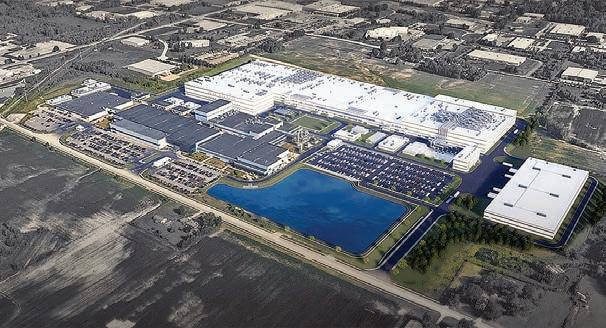
ufacturing technologies,” MMTC President Ingrid Tighe said in a statement last month on the bill.
“This bill ensures that automation replaces the dirty, dull, and dangerous jobs in manufacturing and the positions currently going unfilled in our manufacturing facilities, creating sustainable work opportunities for actual people. This bill will help effectively guide future workforce development initiatives, with true data to back it up.”
The Advanced Manufacturing Expo showcased how the latest wave of digital transformation in manufacturing has introduced new challenges but plenty of solutions involving autonomous ro-
and the Industry 4.0 Accelerator.
The expo also included a futuristic live factory floor demo area with several autonomous mobile robots (AMRs), such as the iconic robot dog Spot from Boston Dynamics and Gray Solutions, an autonomous forklift and other devices helping improve material handling and internal logistics.
Agenda sessions this year also focused Industry 4.0 objectives like overcoming automation “FOMO” (fear of missing out), and navigating industrial IoT applications.
Amid growing needs to adopt these new technologies into production facilities and operations, economic development and state
“In order to remain competitive, Michigan will help prepare manufacturers to adopt new and innovative technologies for the future through programs like the Industry 4.0 initiative,” Quentin Messer Jr., CEO of MEDC and president and chairperson of the Michigan Strategic Fund board, said in a statement when the program was announced in 2022.
Kelly said Automation Alley has helped manufacturers through Project DIAMOnD, or Distributed Independent and Agile Manufac-
With other capabilities, such as artificial intelligence, Kelly sees a slower rate of adoption among the small manufacturers. Part of his work with Automation Alley is providing “that nudge” to steer small businesses in the direction of those aspects of Industry 4.0.
“The big players are adopting AI very quickly,” Kelly said. “The small companies are starting to use ChatGPT and ask it some questions, but I don’t see them going, ‘I wonder how I could use this in my business?’ I’m not sure they’re there yet.
“Small manufacturers are at such a risk because the world is changing very, very fast … we need to help them learn what they need to know and be confident.”
BFP Enterprises LLC d/b/a Foresight Management seeks an Energy Engineer for a position in Grand Rapids, MI. Successful candidates must have a Bachelor’s in any Engineering field and 6 months exp. Must also hold certification in LEED Green Associate and Lean Six Sigma Certified Green Belt.
Email resume
ATTN: Montana Bergy at montana@fsmgmt.com.
viastore Systems, Inc. seeks a Controls Engineer in Grand Rapids, Michigan. Requires a bachelor’s degree in Electrical Engineering and 24 months experience as Controls Engineer. Experience must include two years designing electrical manufacturing equipment utilizing the following programs: (1) AutoCAD Electrical; and (2) Rockwell software.
Travel required from headquarters in Grand Rapids, Michigan to client sites in Aurora, Ohio and Jasper, Alabama at least 120 days each year. Multiple openings.
Email resume to c.winterhalder@viastore.com
ate major opportunities for the region, and add research and development and “white-collar technical” jobs along with the company’s manufacturing operations.
“LG Chem has exceeded expectations,” Owens said. “They’re hiring well above the average wage and with 100% paid health care, so really a great employer of choice. But if we can have some of the more white-collar technical jobs, I think it would make it so it’s a facility that has hundreds of years of staying power.”
LG Energy Solution Michigan built its existing Holland battery plant in 2009. The expansion plans were made public in early 2022, and call for 13 new buildings next to the existing plant, including a roughly 1 million-square-foot main manufacturing building. The addition is more than five times the amount of the company’s initial $303 million investment in Holland.
Construction is “substantially complete” on structural steel work on the site, and LG is projected to take possession of the new build in April 2024, with production expect-
ed to start a year later, Traboulay said.
However, a lack of housing in the area has challenged LG’s hiring effort, causing some engineers to rent out hotels because they can’t find homes in the area, Traboulay said.
“I think there is some good work being done in housing, but it continues to be a crisis for us,” Owens said. “How are we going to continue to help our companies grow if people (who work there) are living farther and farther away because they can’t find an affordable place?”
LG Energy Solution Michigan plans to employ about 1,000 people at the new plant, which would have about four times the capacity of the existing production plant in Holland.
The Michigan Strategic Fund board supported the expansion project in March 2022 with $56.5 million in various grants as well as a 20-year renaissance zone valued at roughly $132.6 million. Managing Editor Andy Balaskovitz contributed reporting to this story.
Northpointe Bank seeks a Sr. Business Intelligence Analyst. Required: Bachelor’s degree in Computer Science, Twenty Four months experience as Business Intelligence Analyst, Data Engineer, or Software Developer, experience must include two years of the following in the financial services industry: 1) data warehouse design with MS SQL Server; ETL development with SSIS; programming with TSQL; report development with SSRS; Power BI Report Server administration; and 2) web development using C#, ASP.net, Web Forms, HTML5, Angular JS, JQuery, and AJAX, and if telecommuting, travel required to Grand Rapids, Michigan, 15 percent of time. Telecommuting from any location within the US is an option for this position. Multiple openings. Email resume to sheri.duchemin@northpointe.com.
Steelcase, Inc. seeks a Finance Manager in Grand Rapids, MI responsible for leading ERP cost-structure architecture. BS degree (or foreign academic equivalent) in Acctg., Fin., or rltd. 5 yrs. of exp. in job offered or rltd. Alternatively, will accept 8 yrs. of exp. in job offered or rltd. (if no degree). To apply for this posting: please go to https://careers.steelcase.com and search for job code 218376. No phone calls, please.
August 21, 2023 | CRAIN’s gRAND RAPIDs BusINEss | 25
LG ENERGY
“It’s not about that robot taking the job of a person … there are no people. The biggest complaint in manufacturing right now is: ‘I can’t find enough people.”
Tom Kelly, the CEO and executive director of Troy-based Automation Alley
MANUFACTURING From Page 5
LGES Michigan’s expanded campus in Holland. | Lg ENERgY sOLutION MICHIgAN
To Grand Rapids’ freshman state rep, urban investments will chart Michigan’s future

State Rep. Kristian Grant believes urban centers are the lifeblood of states, responsible for charting their future prosperity. That’s why she has prioritized housing and urban economic development in her freshman year as the Democrat state representative serving Grand Rapids’ southeast side. Grant, 36, served six years on the Grand Rapids Public Schools board — including two as president during the COVID-19 pandemic — before being elected to represent the district in Lansing. She also owns a Grand Rapids-based real estate development company, Grant Development Co. LLC, that focuses on small-scale projects in urban cores. Those combined experiences have contributed to Grant’s legislative policy priorities, which she recently discussed with Crain’s Grand Rapids Business.
| By Andy Balaskovitz
You backed legislation this year to allow certain cities, including Grand Rapids, and townships to create local land banks. How did this legislation come about and why was it important to you?
The land bank legislation was up last session and didn’t get much traction. And if I’m being quite honest, I think it’s because people saw it as solely a Grand Rapids issue. For me, it was a much larger issue. … People think of urban economic development as if that just means development in Black neighborhoods, so that turns some people off. But to me, I see our urban cores as centers of innovation, especially in Michigan. Our urban cores are where we have really seen innovation spur the direction of the state.
When we’re talking about that and we’re talking about properties that land banks hold, they’re in our urban cores. And a lot of times, there’s a disconnect between the city and the county level, especially in these places where there are no county land banks (as is the case in Kent County). That’s why I was passionate about it. But I really think when we talk about what’s next for Michigan, where are we headed when it comes to economic development, it has to include those centers that really brought us to where we are right now. It has to include investment there. If people don’t have places to live, places to be, we won’t see the revitalization of those areas. The land bank is one entity that can really be a tool for that.
What’s a practical implication for the city of Grand Rapids potentially creating a land bank?
For instance, a city land bank that’s working closer with the overall plan of the city and knows exactly where the properties are, who those communities are. They have more tools at their disposal than the county land bank. In Grand Rapids, our city land bank will be able to pair ARPA dollars and other funds that they have. We have a housing fund in Grand Rapids and we’ll be able to pair dollars and be really intentional about the redevelopment of properties that are right in the city center. And it’s personal for the city. It’s personal that they make sure that these communities
and neighborhoods are serving the people of Grand Rapids in the best way possible. If it was an entity that was a little further removed, it’s more focused on getting the properties back on the tax roll.
Usually when we talk about land banks, it’s not necessarily about a broader economic development view, it’s that we have properties that taxes aren’t being paid on and let’s get them back on the payroll.
Housing is clearly a policy priority for you. What are some other housing strategies that you’re seeing either in the early stages or on the horizon that could really move the needle on addressing things like homeownership?
Coming back in the fall (legislative) session, we will have some really robust policy around housing that will be introduced. What I can say as far as what we’ve already done: I was really excited about the addition to the brownfield program that allowed for brownfield projects to include residential, which wasn’t there before. And I think we will really see more projects that have housing and affordable costs because of that.
Can you preview any housing policies that will be introduced this fall?
My real focus when we talk about housing is: How do we find ways that make construction easier and more cost effective? There are a lot of different lenses that people can take when it comes to housing, but my thing is we have a shortage because it is so expensive to build housing right now, and once you get past the price, we also have a lot of red tape at local levels.
I want to really help create policy that helps to remove some of the barriers and make it more affordable at the state level. We can’t be the gap funding for all housing. We don’t have enough dollars. My focus is on how we remove the red tape.
You also led legislation this year to make the pandemic-era cocktails-to-go rule permanent. Why was this important to you and did you see this as an economic development issue?
Yeah, absolutely. To me, it was about economic development. I don’t know that I am always going to be the person voting to free the booze in all the ways. But for me, this was specifically about supporting local businesses.
We saw our local businesses really struggle, especially our restaurants during the pandemic. Although almost any restaurant you go to now is jam-packed, they’re still struggling with staffing and processes and getting supplies in. Allowing people to be able to come in and order food and cocktails to go just really helps them while they’re trying to maintain. I’ve talked to so many restaurant owners who are all saying the same thing: ‘Yes, we have people coming back in our doors, but to-go deliveries never stopped. Those never slowed down. And they’ve become a huge portion of our revenue.’
You recently led some public listening sessions in Grand Rapids about economic development in urban areas and ways cities can better serve residents rather than displace them. How can Michigan cities be better about fostering growth without pushing out residents? That’s one of my biggest passions. That’s the work that I want to do. I always say we should be building and investing for the people who are here right now, not for the people that we anticipate will come in five or 10 years. There are people who have stuck with us, and we should be serving them. Let’s attract, but retaining should be our first priority.
When I talk about investment in our communities, sometimes people want to hold the business owners or the homeowners accountable to a higher standard than we hold our local or state government. They’ll say, ‘Why aren’t there new roofs here? Why aren’t the yards done?’ But we don’t say, ‘Well, why hasn’t there been investment in infrastructure in the last 10 years?’ And I see it as a partnership. As the state, county and city government are investing in sewage systems and lighting systems and streetscaping, broadening the sidewalks and putting in bike lanes … then the people living there will have a higher quality of life and then they also are able to invest. It’s a system where mutual investment is important. I believe that if we begin to do those things, we’ll see the people who are currently there give value to their community because they see us really acknowledging that there is value.
CrainsGrandRapids.com
President and CEO KC Crain
Group publisher Jim Kirk, (312) 397-5503 or jkirk@crain.com
Executive editor Mickey Ciokajlo, mickey.ciokajlo@crain.com
Editor Joe Boomgaard, joe.boomgaard@crain.com
Managing editor Andy Balaskovitz, andy.balaskovitz@crain.com
Special projects editor tim Gortsema, tim.gortsema@crain.com
Director of audience and engagement Elizabeth Couch, elizabeth.couch@crain.com
Audience engagement editor
Matthew Pollock, matthew.pollock@crain.com
Creative director thomas J. Linden, tlinden@crain.com
Associate crative director Karen Freese Zane
Digital design editor Jason McGregor
Art directors
Kayla Byler, Carolyn McClain, Joanna Metzger
Senior digital news designer Stephanie Swearngin
Notables coordinator Ashley Maahs
REPORTERS
Kate Carlson, real estate, kate.carlson@crain.com
Jack Grieve, audience engagement, jack.grieve@crain.com
Abby Poirier, restaurants, retail and agribusiness, abigail.poirier@crain.com
Mark Sanchez, health care and finance, mark.sanchez@crain.com

Kayleigh Van Wyk, manufacturing, technology and law, kayleigh.vanwyk@crain.com
Rachel Watson, residential real estate, insurance and tourism, rachel.watson@crain.com
Danielle Nelson, research and data, danielle.nelson@crain.com
ADVERTISING
Senior vice president of sales
Susan Jacobs, susan.jacobs@crain.com
Advertising & event sales director
Jill May, jill.may@crain.com
Account executive
Shelly Keel, shelly.keel@crain.com
Michigan events director
Samantha Flowers, samantha.flowers@crain.com
Marketing and events coordinator
Matthew Chaffee, matthew.chaffee@crain.com
People on the Move manager
Debora Stein, dstein@crain.com
Classified sales
Suzanne Janik, sjanik@crain.com
Sales assistant Rachel Smith
Inside sales tawni Sharp
CRAIN’S CONTENT STUDIO
Senior director of Crain’s Content Studio Kristin Bull, kbull@crain.com
Crain’s Content Studio manager Clare Pfeiffer Content marketing specialist Allie Jacobs
PRODUCTION
Vice president, product Kevin Skaggs Product manager tim Simpson
Prepress/production director Simone Pryce
CUSTOMER SERVICE
(833) 830-7446 toll free (845) 267-3031 local line (for any foreign calls) customerservice@crainsgrandrapids.com
Crain’s Grand Rapids Business is published by Crain Communications Inc.
Chairman Keith E. Crain
Vice chairman Mary Kay Crain
President and CEO KC Crain
Senior executive VP Chris Crain
Chief Financial Officer Robert Recchia
G.D. Crain Jr. Founder (1885-1973)
Mrs. G.D. Crain Jr. Chairman (1911-1996)
Editorial & Business Offices 1155 Gratiot Ave., Detroit MI 48207-2732; (313) 446-6000
Volume 40, Number 16
Crain’s Grand Rapids Business (ISSN 2836-7723) is published biweekly, with an extra issue in May, October and December, by Crain Communications Inc. at 1155 Gratiot Ave., Detroit, MI 48207-2732. Periodical postage paid at Grand Rapids, Michigan.
© Entire contents copyright 2023 by Crain Communications Inc. All rights reserved. Reproduction or use of editorial content in any manner without permission is prohibited.
Subscriptions: $59 per year. Advertising rates and specifications at www.crainsgrandrapids.com or by request.
Crain’s Grand Rapids Business does not accept unsolicited contributions.
Postmaster: Send address changes to Crain’s Grand Rapids Business, 1155 Gratiot Ave., Detroit, MI 48207-2732.
26 | CRAIN’S GRAND RAPIDS BUSINESS | AUGUSt 21, 2023 THE CONVERSATION
State Rep. Kristian Grant represents Grand Rapids’ southeast side.
MICHIGAN CANNABIS BUSINESS SUMMIT Green Market Report





September 6, 2023 | 11:30AM - 5:30PM | One Campus Martius, 16th Floor The Michigan Cannabis Business Summit is your opportunity to gain valuable insights from the state’s leading cannabis professionals on achieving success and understanding consumer preferences.
Speakers REGISTER NOW GreenMarketReport.com/Michigan_Summit CIMONE CASSON Agent Cannas Capital LLC CALVIN JOHNSON JR. Co-Founder Primitiv BRIAN HANNA Executive Director Michigan Cannabis Regulatory Agency ROB SIMS Co-Founder Primitiv
Featured



Your Space, Our Business CONSTRUCTION | REAL ESTATE | PROPERTY MANAGEMENT firstcompanies.com | 616.698.5000 MYRTH











































































 By David Eggert
By David Eggert

 -
-





 By Kayleigh Van Wyk
By Kayleigh Van Wyk


























